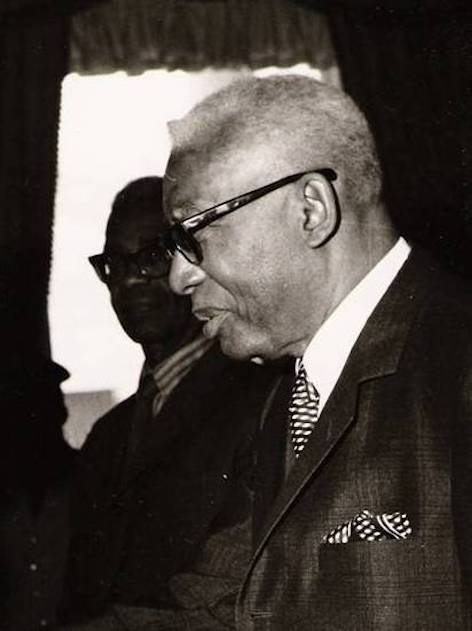
ハイチの歴史 (III): 1946年以降
History of Haiti after 1946

ハイチの歴史(https://en.wikipedia.org/wiki/History_of_Haiti)から、ここでは、ハイチの歴史 (III): 1946年以降を描写する。
++++++++++++++++++++++
☆ハイチの歴史 (III): 1946年以降(このページ)
++++++++++++++++++++++
☆1946 年までのハイチの歴史は「ハイチの歴史(1802-1946)」「米国海兵隊占拠時代のハイチ(1915-1934)」「ハイチの歴史(1804年まで)」を参照してください。
| Élie
Lescot was of mixed race and had served in numerous government posts.
He was competent and forceful, and many considered him a sterling
candidate for the presidency, despite his elitist background. Like the
majority of previous Haitian presidents, however, he failed to live up
to his potential. His tenure paralleled that of Vincent in many ways.
Lescot declared himself commander in chief of the military, and power
resided in a clique that ruled with the tacit support of the Garde. He
repressed his opponents, censored the press, and compelled the
legislature to grant him extensive powers. He handled all budget
matters without legislative sanction and filled legislative vacancies
without calling elections. Lescot commonly said that Haiti's declared
state-of-war against the Axis powers during World War II justified his
repressive actions. Haiti, however, played no role in the war except
for supplying the United States with raw materials and serving as a
base for a United States Coast Guard detachment.[72] Aside from his authoritarian tendencies, Lescot had another flaw: his relationship with Rafael Trujillo. While serving as Haitian ambassador to the Dominican Republic, Lescot fell under the sway of Trujillo's influence and wealth. In fact, it was Trujillo's money that reportedly bought most of the legislative votes that brought Lescot to power. Their clandestine association persisted until 1943, when the two leaders parted ways for unknown reasons. Trujillo later made public all his correspondence with the Haitian leader. The move undermined Lescot's already dubious popular support.[72] In January 1946, events came to a head when Lescot jailed the Marxist editors of a journal called La Ruche (The Beehive). This action precipitated student strikes and protests by government workers, teachers, and shopkeepers in the capital and provincial cities. In addition, Lescot's mulatto-dominated rule had alienated the predominantly black Garde. His position became untenable, and he resigned on 11 January. Radio announcements declared that the Garde had assumed power, which it would administer through a three-member junta.[72] |
エリー・レス
コットは混血で、数多くの政府のポストに就いていた。彼は有能で力持ちであり、エリート主義的な経歴にもかかわらず、多くの人々は彼を大統領候補とし
て高く評価した。しかし、歴代のハイチ大統領の大半がそうであったように、彼はその潜在能力を発揮することができなかった。彼の在任期間は、多くの点で
ヴィンセントと類似していた。レスコは自らを軍の最高司令官と宣言し、権力はガルドの暗黙の支持のもとに支配する徒党に握られた。彼は反対派を弾圧し、報
道を検閲し、立法府に広範な権限を与えるよう強要した。彼は立法府の承認なしにすべての予算問題を処理し、選挙を招集することなく立法府の空席を埋めた。
レスコは、ハイチが第二次世界大戦中に枢軸国に対して宣戦布告していたことが、彼の抑圧的な行動を正当化する理由であるとよく言っていた。しかし、ハイチ
は、アメリカに原材料を供給し、アメリカ沿岸警備隊の基地として機能した以外、戦争において何の役割も果たさなかった[72]。 レスコットには、その権威主義的傾向のほかに、ラファエル・トルヒーヨとの関係というもうひとつの欠点があった。ドミニカ共和国のハイチ大使を務めていた とき、レスコットはトルヒーヨの影響力と富の支配下に置かれた。実際、レスコットに権力をもたらした立法府の票の大半を買ったのは、トルヒーヨの金だった と言われている。2人の秘密の関係は1943年まで続いたが、2人の指導者は理由もわからず決別した。トルヒーヨは後にハイチ人指導者との書簡をすべて公 開した。この動きは、すでに怪しかったレスコットの民衆の支持を弱めた[72]。 1946年1月、大統領エリー・レスコットがラ・リューシュ(蜂の巣)という雑誌のマルクス主義者編集者を投獄したことで事態は収束に向かった。この行動 は、首都や地方 都市における学生ストライキや公務員、教師、商店主による抗議行動を引き起こした。さらに、レスコの混血支配は、黒人の多いガルドを疎外した。レスコの立 場は危うくなり、1月11日に辞任した。ラジオのアナウンスでは、ガルドが権力を掌握し、3人の議員からなる純政権によって統治すると宣言された [72]。 |
Revolution of 1946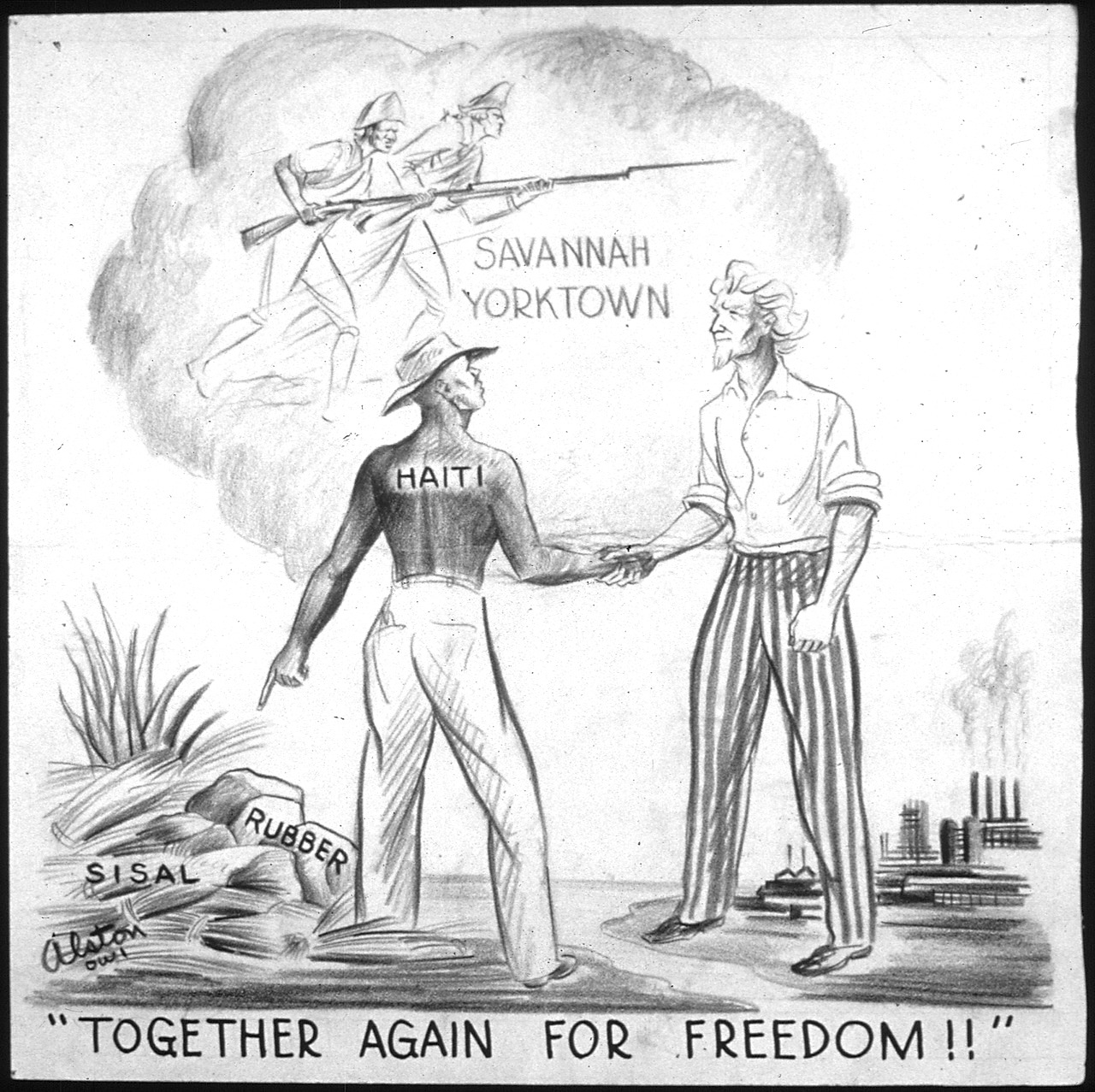 "Together again for freedom", 1943 U.S. leaflet The Revolution of 1946 was a novel development in Haiti's history, as the Garde assumed power as an institution, not as the instrument of a particular commander. The members of the junta, known as the Military Executive Committee (Comité Exécutif Militaire), were Garde commander Colonel Franck Lavaud, Major Antoine Levelt, and Major Paul E. Magloire, commander of the Presidential Guard. All three understood Haiti's traditional way of exercising power, but they lacked a thorough understanding of what would be required to make the transition to an elected civilian government. Upon taking power, the junta pledged to hold free elections. The junta also explored other options, but public clamor, which included public demonstrations in support of potential candidates, eventually forced the officers to make good on their promise.[72] Haiti elected its National Assembly in May 1946. The Assembly set 16 August 1946, as the date on which it would select a president. The leading candidates for the office—all of whom were black—were Dumarsais Estimé, a former school teacher, assembly member, and cabinet minister under Vincent; Félix d'Orléans Juste Constant, leader of the Haitian Communist Party (Parti Communiste d'Haïti—PCH); and former Garde commander Démosthènes Pétrus Calixte, who stood as the candidate of a progressive coalition that included the Worker Peasant Movement (Mouvement Ouvrier Paysan—MOP). MOP chose to endorse Calixte, instead of a candidate from its own ranks, because the party's leader, Daniel Fignolé, was only thirty-three years old—too young to stand for the nation's highest office. Estimé, politically the most moderate of the three, drew support from the black population in the north, as well as from the emerging black middle class. The leaders of the military, who would not countenance the election of Juste Constant and who reacted warily to the populist Fignolé, also considered Estimé the safest candidate. After two rounds of polling, legislators gave Estimé the presidency.[72] |
1946年の革命 「自由のために再び団結」、1943年米国のビラ 1946年の革命は、ハイチ史上における新たな展開であった。衛兵隊が特定の司令官の道具としてではなく、制度として権力を握ったからである。軍事執行委 員会(Comité Exécutif Militaire)として知られる軍事評議会のメンバーは、衛兵隊司令官のフランク・ラヴォー大佐、アントワーヌ・レヴェルト少佐、そして大統領警護隊 司令官のポール・E・マグロア大佐であった。3人ともハイチの伝統的な権力行使のやり方を理解していたが、選挙による文民政府への移行に必要なことを十分 に理解していなかった。政権を握ると、軍事委員会は自由選挙の実施を誓った。軍事委員会は他の選択肢も模索したが、有力候補者を支持するデモを含む国民の 抗議により、最終的に将校たちは公約を守らざるを得なくなった。 ハイチは1946年5月に国民議会を選出した。議会は1946年8月16日を大統領選出の日と定めた。有力な候補者(全員が黒人)は、元教師で議会メン バー、ヴィンセント政権下で閣僚を務めたデュマルセ・エスティメ、ハイチ共産党(Parti Communiste d'Haïti)の党首フェリックス・ドルレアン・ユステ・コンスタント、 、および元ガード司令官のデモステネス・ペトルス・カリクストで、労働農民運動(Mouvement Ouvrier Paysan - MOP)を含む進歩連合の候補者として立候補した。MOPは、党首ダニエル・フィグノレが33歳と若く、国民の最高職に立候補するには若すぎたため、党内 の候補者ではなくカリクストを支持することを選んだ。3人のうちで最も政治的に穏健派であったエスティメは、北部の黒人層や台頭しつつあった黒人中流階級 の支持を集めた。軍部は、ジュスト・コンスタントの当選を認めず、民衆派のフィニョレにも警戒感を示していたが、エスティメを最も安全な候補者と考えた。 2回の投票を経て、議員たちはエスティメを大統領に選出した。[72] |
Estimé's presidency (1946–1950)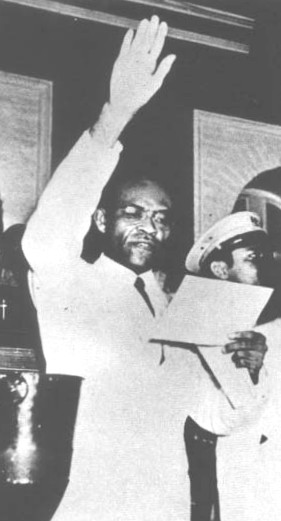 Dumarsais Estimé Estimé's election represented a break with Haiti's political tradition. Although he was reputed to have received support from commanders of the Garde, Estimé was a civilian. Of humble origins, he was passionately anti-elitist and therefore generally anti-mulatto. He demonstrated, at least initially, a genuine concern for the welfare of the people. Operating under a new constitution that went into effect in November 1946, Estimé proposed, but never secured passage of, Haiti's first social- security legislation. He did, however, expand the school system, encourage the establishment of rural cooperatives, raise the salaries of civil servants, and increase the representation of middle-class and lower-class blacks in the public sector. He also attempted to gain the favor of the Garde—renamed the Haitian Army (Armée d'Haïti) in March 1947—by promoting Lavaud to brigadier general and by seeking United States military assistance.[72] Estimé eventually fell victim to two of the time-honored pitfalls of Haitian rule: elite intrigue and personal ambition. The elite had a number of grievances against Estimé. Not only had he largely excluded them from the often lucrative levers of government, but he also enacted the country's first income tax, fostered the growth of labor unions, and suggested that vodou be considered as a religion equivalent to Roman Catholicism—a notion that the Europeanized elite abhorred. Lacking direct influence in Haitian affairs, the elite resorted to clandestine lobbying among the officer corps. Their efforts, in combination with deteriorating domestic conditions, led to a coup in May 1950.[72] To be sure, Estimé had hastened his own demise in several ways. His nationalization of the Standard Fruit Company banana concession sharply reduced the firm's revenues. He alienated workers by requiring them to invest between 10 percent and 15 percent of their salaries in national-defense bonds. The president sealed his fate by attempting to manipulate the constitution in order to extend his term in office. Seizing on this action and the popular unrest it engendered, the army forced the president to resign on 10 May 1950. The same junta that had assumed power after the fall of Lescot reinstalled itself. An army escort conducted Estimé from the National Palace and into exile in Jamaica. The events of May 1946 made an impression upon the deposed minister of labor, François Duvalier. The lesson that Duvalier drew from Estimé's ouster was that the military could not be trusted. It was a lesson that he would act upon when he gained power.[72] |
エスティメ大統領(1946年~1950年) デュマルセ・エスティメ エスティメの当選は、ハイチの政治的伝統からの脱却を意味した。彼は憲兵隊の司令官たちから支援を受けていたと評判だったが、エスティメは文民であった。 謙虚な出自の彼は、熱烈なエリート主義反対論者であり、したがって一般的に混血反対論者でもあった。少なくとも当初は、彼は国民の福祉に対する真の関心を 示していた。1946年11月に施行された新憲法の下で活動したエスティメは、ハイチ初の社会保障法の制定を提案したが、可決には至らなかった。しかし、 彼は学校制度の拡充、農村部の協同組合の設立の奨励、公務員の給与の引き上げ、公共部門における中流階級および下層階級の黒人の代表権の拡大を行った。ま た、1947年3月にハイチ陸軍(Armée d'Haïti)と改名されたガードの支持を得るために、ラヴォーを准将に昇進させ、米国の軍事支援を求めた。 エスティメは最終的に、ハイチ統治の伝統的な落とし穴であるエリートの陰謀と人格的野心の2つに陥った。エリート層はエスティメに対して多くの不満を抱い ていた。彼らは政府の利益の多くを独占しているだけでなく、同国初の所得税を制定し、労働組合の成長を促進し、ヴードゥー教をローマ・カトリックと同等な 宗教として認めるよう提案した。ヨーロッパ化されたエリート層はこれを嫌悪した。ハイチ国内での影響力を欠いたエリート層は、将校団の間で秘密裏にロビー 活動を行うようになった。彼らの努力は、悪化する国内情勢と相まって、1950年5月のクーデターにつながった。 確かに、エスティメはいくつかの点で自らの終焉を早めることとなった。 スタンダード・フルーツ・カンパニーのバナナ利権を国有化したことで、同社の収益は大幅に減少した。 また、労働者に対して給与の10~15%を国防債に投資するよう義務付けたことで、労働者の反感を買った。大統領は、任期延長のために憲法を改ざんしよう としたことで、自らの運命を決定づけた。この行動とそれがもたらした国民の不安を捉え、軍部は1950年5月10日に大統領の辞任を強制した。レスコット 失脚後に政権を握った軍部が再び政権を握った。軍の護衛がエスティメを国民宮殿からジャマイカへの亡命へと導いた。1946年5月の出来事は、失脚した労 働大臣フランソワ・デュバリエに強い印象を与えた。エスティメ失脚からデュバリエが得た教訓は、軍は信用できないということだった。それは後に権力を握っ た際に彼が行動を起こすことになる教訓であった。[72] |
Magloire's presidency (1950–1956)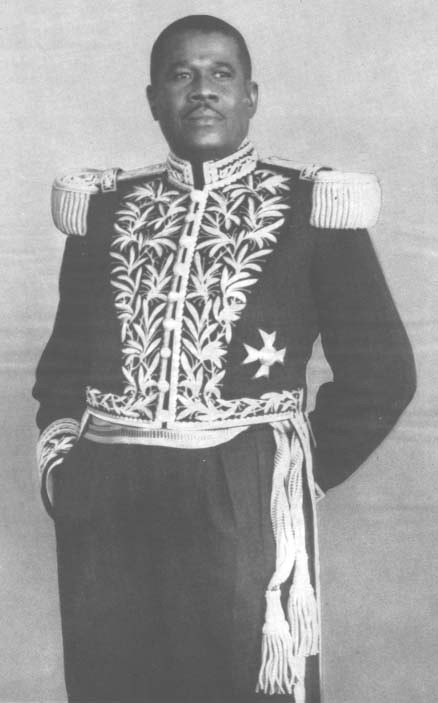 Paul Magloire The power balance within the junta shifted between 1946 and 1950. Lavaud was the preeminent member at the time of the first coup, but Magloire, now a colonel, dominated after Estimé's overthrow. When Haiti announced that its first direct elections (all men twenty-one or over were allowed to vote) would be held on 8 October 1950, Magloire resigned from the junta and declared himself a candidate for president. In contrast to the chaotic political climate of 1946, the campaign of 1950 proceeded under the implicit understanding that only a strong candidate backed by both the army and the elite would be able to take power. Facing only token opposition, Magloire won the election and assumed office on 6 December.[72] Magloire restored the elite to prominence. The business community and the government benefited from favorable economic conditions until Hurricane Hazel hit the island in 1954. Haiti made some improvements on its infrastructure, but most of these were financed largely by foreign loans. By Haitian standards, Magloire's rule was firm, but not harsh: he jailed political opponents, including Fignolé, and shut down their presses when their protests grew too strident, but he allowed labor unions to function, although they were not permitted to strike. It was in the arena of corruption, however, that Magloire overstepped traditional bounds. The president controlled the sisal, cement, and soap monopolies. He and other officials built imposing mansions. The injection of international hurricane relief funds into an already corrupt system boosted graft to levels that disillusioned all Haitians. To make matters worse, Magloire followed in the footsteps of many previous presidents by disputing the termination date of his stay in office. Politicians, labor leaders, and their followers flocked to the streets in May 1956 to protest Magloire's failure to step down. Although Magloire declared martial law, a general strike essentially shut down Port-au-Prince. Again like many before him, Magloire fled to Jamaica, leaving the army with the task of restoring order.[72] |
マグロアの大統領職(1950年~1956年) ポール・マグロア 1946年から1950年の間、軍事政権内の勢力バランスは変化した。最初のクーデターの際にはラヴォーが中心的な役割を果たしたが、エスティメが失脚し た後は、大佐となっていたマグロアが主導権を握った。1950年10月8日にハイチが初の直接選挙(21歳以上の男性全員に選挙権が与えられた)を実施す ると発表すると、マグロアは軍事政権を辞任し、自ら大統領候補となることを宣言した。1946年の混沌とした政治情勢とは対照的に、1950年の選挙戦 は、軍とエリート層の両方から支持される強力な候補者だけが政権を握ることができるという暗黙の了解の下に進められた。形だけの反対勢力と対峙したマグロ アは選挙に勝利し、12月6日に大統領に就任した。 マグロアはエリート層を再び優遇する政策を復活させた。 1954年にハリケーン・ヘイゼルがハイチを襲うまでは、経済状況が良好だったため、ビジネス界と政府は恩恵を受けた。 ハイチはインフラの改善を多少は行ったが、そのほとんどは外国からの融資によって賄われた。ハイチ人の基準から見ると、マグロワールの統治は強固ではあっ たが、厳しくはなかった。彼はフィグノレを含む政治的反対派を投獄し、彼らの抗議が過激になりすぎると彼らの新聞社を閉鎖したが、労働組合の活動は許可 し、ストライキは禁止しなかった。しかし、汚職に関しては、マグロワールは従来の枠を踏み越えていた。大統領はサイザル麻、セメント、石鹸の独占を支配し ていた。彼と他の役人たちは堂々とした邸宅を建てた。すでに腐敗したシステムに国際的なハリケーン救援資金が投入されたことで、汚職はハイチ国民を幻滅さ せるレベルにまで高まった。さらに悪いことに、マグロアは多くの歴代大統領と同様に、任期満了日をめぐって論争を起こした。1956年5月、マグロアが退 陣しないことに抗議して、政治家、労働組合のリーダー、そして彼らの支持者たちが街頭に集まった。マグロア大統領は戒厳令を布告したが、事実上、ポートー プランスはゼネストによって機能停止状態となった。 またもや、多くの前任者たちと同様に、マグロア大統領はジャマイカに逃亡し、軍に秩序回復を委ねた。[72] |
| The rise of Duvalier (1956–1957) The period between the fall of Magloire and the election of Duvalier in September 1957 was a chaotic one, even by Haitian standards. Three provisional presidents held office during this interval; one resigned and the army deposed the other two, Franck Sylvain and Fignolé. Duvalier is said to have engaged actively in the behind-the-scenes intrigue that helped him to emerge as the presidential candidate that the military favored. The military went on to guide the campaign and the elections in a way that gave Duvalier every possible advantage. Most political actors perceived Duvalier—a medical doctor who had served as a rural administrator of a United States-funded anti-yaws campaign before entering the cabinet under Estimé—as an honest and fairly unassuming leader without a strong ideological motivation or program. When elections were finally organized, this time under terms of universal suffrage (both men and women now had the vote), Duvalier painted himself as the legitimate heir to Estimé. This approach was enhanced by the fact that Duvalier's only viable opponent, Louis Déjoie, was a mulatto and the scion of a prominent family. Duvalier scored a decisive victory at the polls. His followers took two-thirds of the legislature's lower house and all of the seats in the Senate.[72] |
デュバリエの台頭(1956年~1957年) マグロワール政権の崩壊から1957年9月のデュバリエの当選までの期間は、ハイチ国内でも混乱の極みにあった。この間、3人の暫定大統領が就任したが、 そのうちの1人は辞任し、残る2人、フランク・シルヴェンとフィグノレは軍によって解任された。デュバリエは、軍部が望む大統領候補として頭角を現すため に、裏で暗躍したと言われている。軍部はその後も、デュバリエにあらゆる利点をもたらすような方法で選挙運動と選挙を指導した。ほとんどの政治家は、エス ティメ政権以前に米国の資金援助による皮膚病対策の地方行政官を務めたことのある医師デュバリエを、強いイデオロギー的動機や政策を持たない誠実で控えめ な指導者と認識していた。 選挙がようやく実施されることになり、今度は普通選挙(男女とも選挙権を得た)の条件の下で実施されたが、デュバリエは自らをエスティメの正当な後継者で あると位置づけた。このアプローチは、デュバリエの唯一の有力な対立候補であるルイ・デジョワが混血であり、著名な一族の出身であったという事実によって 強化された。デュバリエは選挙で決定的な勝利を収めた。彼の支持者は立法府の下院の3分の2の議席と上院の全議席を占めた。[72] |
| The Duvalier era (1957–1986) Main article: Duvalier dynasty 'Papa Doc' (1957–1971)  François Duvalier in 1968 A former Minister of Health who had earned a reputation as a humanitarian while serving as an administrator in a U.S.-funded anti-yaws campaign, François Duvalier (known as "Papa Doc") soon established another dictatorship. His regime is regarded as one of the most repressive and corrupt of modern times, combining violence against political opponents with exploitation of Vodou to instill fear in the majority of the population. Duvalier's paramilitary police, officially the Volunteers for National Security (Volontaires de la Sécurité Nationale – VSN) but more commonly known as the Tonton Macoutes, named for a Vodou monster, carried out political murders, beatings, and intimidation. An estimated 30,000 Haitians were killed by his government.[74] Duvalier employed rape as a political tool to silence political opposition.[75] Incorporating many houngans into the ranks of the Macoutes, his public recognition of Vodou and its practitioners and his private adherence to Vodou ritual, combined with his reputed private knowledge of magic and sorcery, enhanced his popular persona among the common people and served as a peculiar form of legitimization. Duvalier's policies, designed to end the dominance of the mulatto elite over the nation's economic and political life, led to massive emigration of educated people, deepening Haiti's economic and social problems. However, Duvalier appealed to the black middle class of which he was a member by introducing public works into middle-class neighborhoods that previously had been unable to have paved roads, running water, or modern sewage systems. In 1964, Duvalier proclaimed himself "President for Life". The Kennedy administration suspended aid in 1961, after allegations that Duvalier had pocketed aid money and intended to use a Marine Corps mission to strengthen the Macoutes. Duvalier also clashed with Dominican President Juan Bosch in 1963, after Bosch provided aid and asylum to Haitian exiles working to overthrow his regime. He ordered the Presidential Guard to occupy the Dominican chancery in Pétion-Ville to apprehend an officer involved in a plot to kidnap his children, leading Bosch to publicly threaten to invade Haiti. However, the Dominican army, which distrusted Bosch's leftist leanings, expressed little support for an invasion, and the dispute was settled by OAS emissaries. In 1971, Papa Doc entered into a 99-year contract with Don Pierson representing Dupont Caribbean Inc. of Texas for a free port project on the old buccaneer stronghold of Tortuga island located some 10 miles (16 km) off the north coast of the main Haitian island of Hispaniola. |
デュバリエ時代(1957年~1986年) 詳細は「デュバリエ王朝」を参照 パパ・ドク(1957年~1971年)  1968年のフランソワ・デュバリエ 米国の資金援助によるイボ対策キャンペーンの行政官として人道主義者として名を馳せた元保健大臣フランソワ・デュバリエ(通称「パパ・ドク」)は、間もな くして新たな独裁政権を樹立した。彼の政権は、政治的反対派に対する暴力と、国民の大多数に恐怖心を植え付けるためのヴードゥー教の悪用を組み合わせた、 現代における最も抑圧的で腐敗した政権のひとつとみなされている。デュバリエの準軍事警察は、公式には「国家の安全のためのボランティア (Volontaires de la Sécurité Nationale – VSN)」と呼ばれていたが、一般にはヴードゥー教の怪物にちなんで「トントン・マクーテ(Tonton Macoutes)」と呼ばれ、政治的暗殺、暴行、脅迫を行っていた。推定3万人のハイチ人がデュバリエ政権によって殺害された。[74] デュバリエは政治的反対派を黙らせるためにレイプを政治的道具として用いた。[75] 多くのフンガンをマクゥートの地位に組み込み、ヴードゥー教とその信奉者を公に認め、また、ヴードゥー教の儀式を個人的に遵守したことは、彼が呪術的知識 を有しているという評判と相まって、一般大衆の間で彼の人格を高め、独特な形での正当化の役割を果たした。 デュバリエの政策は、混血エリート層による国民の経済および政治生活への支配を終わらせることを目的としたものであったが、結果として、教育を受けた人々 の大量の国外移住を招き、ハイチの経済および社会問題を深刻化させた。しかし、デュバリエは、自身もその一員である黒人中流階級にアピールし、それまで舗 装された道路や水道、近代的な下水設備を持てなかった中流階級の地域に公共事業を導入した。1964年、デュバリエは自らを「終身大統領」と宣言した。 ケネディ政権は、デュバリエが支援金を着服し、マクーテを強化するために海兵隊の派遣を利用しようとしているという疑惑が浮上した1961年に支援を停止 した。また、デュバリエは1963年に、自身の政権を転覆させようとしていたハイチ亡命者にボッシュが支援と亡命先を提供したことを受け、ドミニカ共和国 大統領フアン・ボッシュと衝突した。デュバリエは、子供たちを誘拐しようとした陰謀に関与した将校を捕らえるために、大統領警護隊にペシオンヴィルのドミ ニカ外務省を占拠するよう命じた。これにより、ボッシュは公にハイチ侵攻をほのめかすに至った。しかし、ボッシュの左派傾向を信用していなかったドミニカ 軍は侵攻にほとんど賛成せず、この紛争は米州機構の特使によって解決された。 1971年、パパ・ドクは、テキサス州のデュポン・カリビアン社を代表するドン・ピアソンと、ハイチ本島イスパニョーラ島の北岸から約16km離れた海賊 の要塞であったトルトゥーガ島での自由港プロジェクトに関する99年契約を締結した。 |
'Baby Doc' (1971–1986)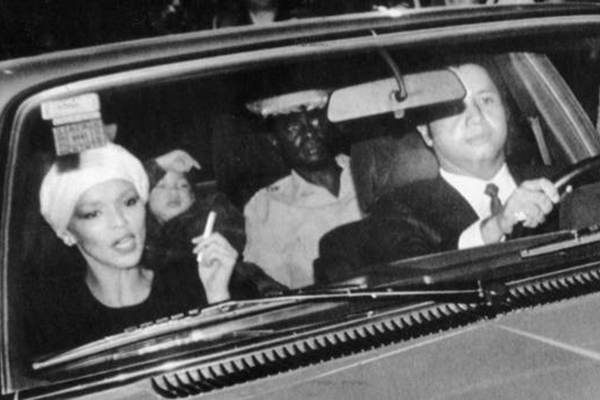 Jean-Claude and Michèle Duvalier en route to the airport to flee the country, 7 February 1986 On Duvalier's death in April 1971, power passed to his 19-year-old son Jean-Claude Duvalier (known as "Baby Doc"). Under Jean-Claude Duvalier, Haiti's economic and political condition continued to decline, although some of the more fearsome elements of his father's regime were abolished. Foreign officials and observers also seemed more tolerant toward Baby Doc, in areas such as human-rights monitoring, and foreign countries were more generous to him with economic assistance. The United States restored its aid program in 1971. In 1974, Baby Doc expropriated the Freeport Tortuga project and this caused the venture to collapse. Content to leave administrative matters in the hands of his mother, Simone Ovid Duvalier, while living as a playboy, Jean-Claude enriched himself through a series of fraudulent schemes. Much of the Duvaliers' wealth, amounting to hundreds of millions of dollars over the years, came from the Régie du Tabac (Tobacco Administration), a tobacco monopoly established by Estimé, which expanded to include the proceeds from all government enterprises and served as a slush fund for which no balance sheets were ever kept.[76] His marriage, in 1980, to a beautiful mulatto divorcée, Michèle Bennett, in a $3 million (~$9.31 million in 2023) ceremony, provoked widespread opposition, as it was seen as a betrayal of his father's antipathy towards the mulatto elite. At the request of Michèle, Papa Doc's widow Simone was expelled from Haiti. Baby Doc's kleptocracy left the regime vulnerable to unanticipated crises, exacerbated by endemic poverty, most notably the epidemic of African swine fever virus—which, at the insistence of USAID officials, led to the slaughter of the creole pigs, the principal source of income for most Haitians; and the widely publicized outbreak of AIDS in the early 1980s. Widespread discontent in Haiti began in 1983, when Pope John Paul II condemned the regime during a visit, finally provoking a rebellion, and in February 1986, after months of disorder, the army forced Duvalier to resign and go into exile. |
「ベイビー・ドク」(1971年~1986年) 国外逃亡のため空港へ向かうデュバリエ夫妻、1986年2月7日 1971年4月にデュバリエが死去すると、19歳の息子ジャン=クロード・デュバリエ(通称「ベイビー・ドク」)が権力を継承した。ジャン=クロード・ デュヴァリエのもとで、ハイチの経済および政治状況は悪化の一途をたどったが、父親の政権下で最も恐れられていたいくつかの要素は廃止された。 外国の政府高官や監視員も、人権監視などの分野ではベイビー・ドックに対して寛容な態度を示し、諸外国も経済援助を惜しまなかった。 米国は1971年に援助プログラムを再開した。1974年、ベビー・ドクはフリーポート・トルトゥーガのプロジェクトを接収し、これにより事業は破綻し た。 行政事項を母親シモーヌ・オヴィッド・デュヴァリエに任せ、自分はプレイボーイとして暮らすことに満足していたジャン=クロードは、一連の詐欺的計画によ り私腹を肥やした。デュバリエ夫妻の富の多くは、長年にわたって数億ドルに上り、エステメが設立したたばこ専売公社Régie du Tabac(たばこ管理局)から得たものであった。この公社は、政府系企業の収益をすべて取り込み、収支報告書が作成されることのない裏金として機能して いた。 1980年に、父親が混血エリートに対して抱いていた反感を裏切る行為と見なされ、300万ドル(2023年現在の価値で931万ドル)の結婚式を挙げた 美しい混血のバツイチ女性ミシェル・ベネットとの結婚は、広範な反対を招いた。ミシェルの要請により、パパ・ドクの未亡人シモーヌはハイチから追放され た。ベイビー・ドクの独裁体制は、予想外の危機に対して脆弱であり、蔓延する貧困によってさらに悪化していた。特に、米国国際開発庁(USAID)の役人 の強い要請により、ほとんどのハイチ人の主な収入源であったクレオール種の豚が虐殺されたアフリカ豚コレラウイルスの流行、および1980年代初頭に広く 報道されたエイズの発生が挙げられる。1983年、教皇ヨハネ・パウロ2世が訪問中にデュバリエ政権を非難したことで、ハイチ国内の不満が爆発し、ついに 反乱が勃発した。そして、数か月にわたる混乱の後、1986年2月に軍がデュバリエを辞任と亡命に追い込んだ。 |
The struggle for democracy
(1986–present day)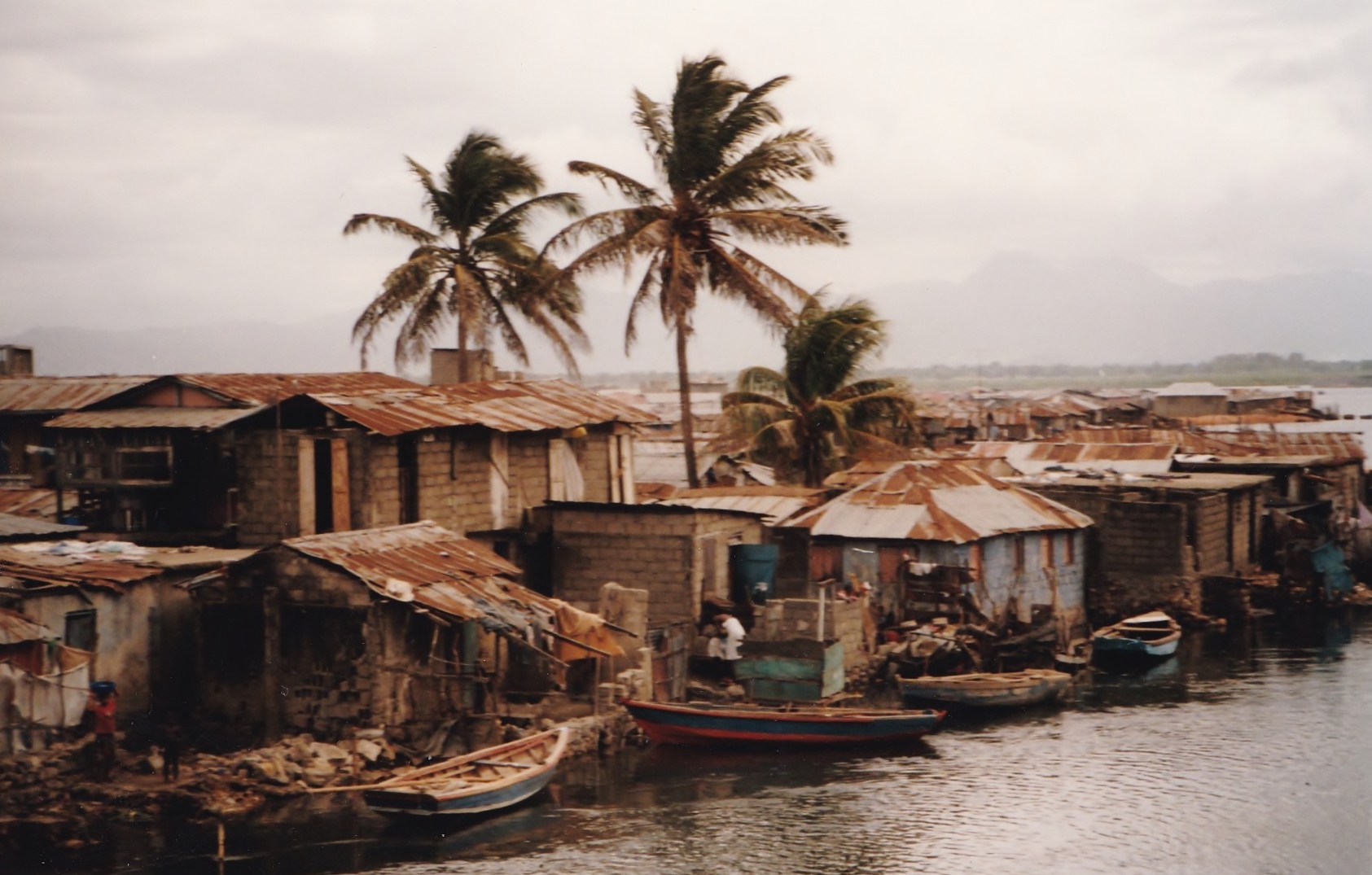 Fishing village in Haiti, 1996 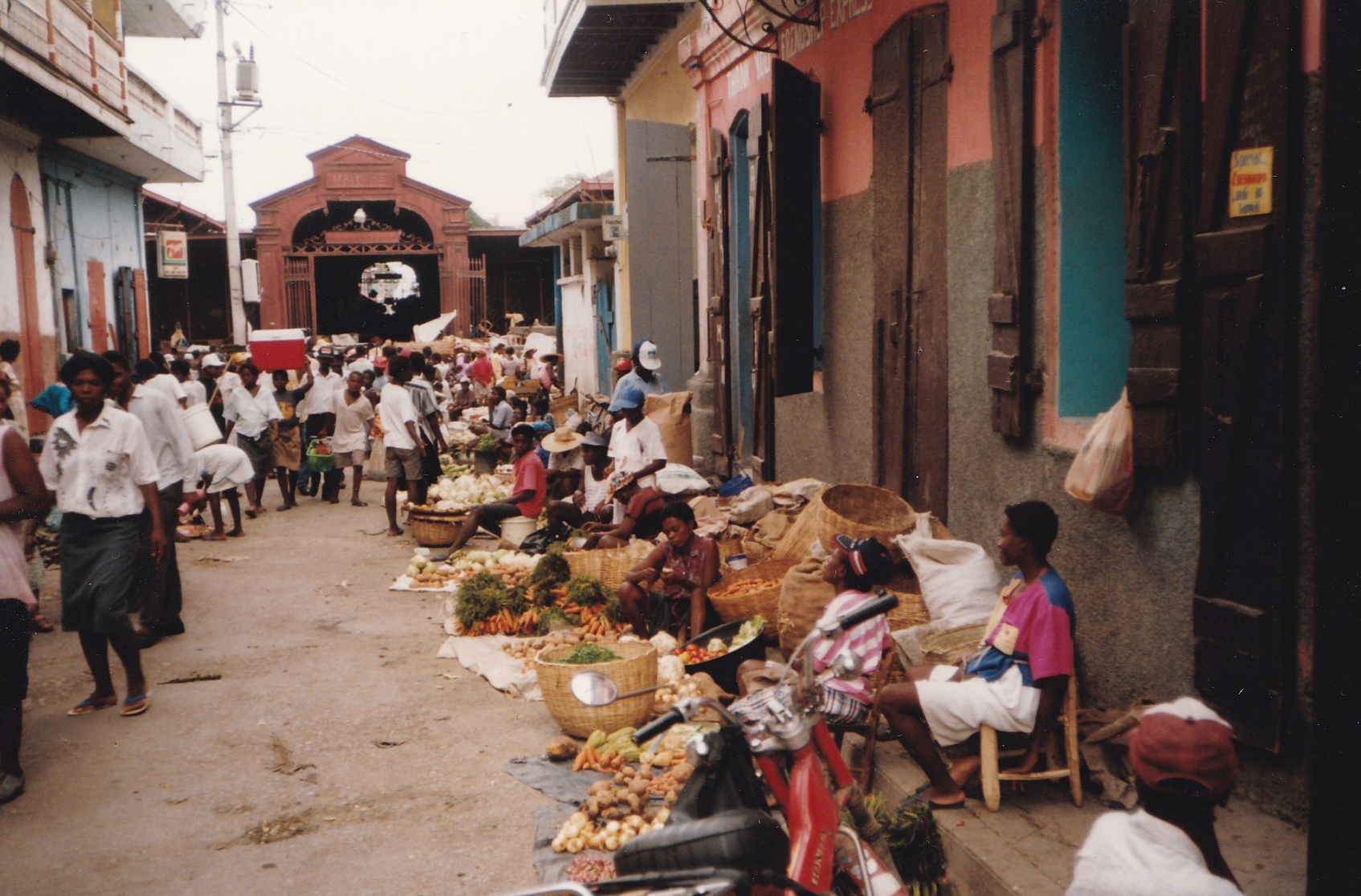 Market street in Port-au-Prince, 1996 Transitional government (1986–1990) From 1986 to early 1988 Haiti was ruled by a provisional military government under General Namphy. In 1987, a new constitution was ratified, providing for an elected bicameral parliament, an elected president, and a prime minister, cabinet, ministers, and supreme court appointed by the president with parliament's consent.[77] The Constitution also provided for political decentralization through the election of mayors and administrative bodies responsible for local government. The November 1987 elections were cancelled after troops massacred 30–300 voters on election day.[78] Jimmy Carter later wrote that "Citizens who lined up to vote were mowed down by fusillades of terrorists' bullets. Military leaders, who had either orchestrated or condoned the murders, moved in to cancel the election and retain control of the Government."[79] The election was followed several months later by the Haitian presidential election, 1988, which was boycotted by almost all the previous candidates, and saw turnout of just 4%.[80] The 1988 elections led to Professor Leslie Manigat becoming president, but three months later he too was ousted by the military. Further instability ensued, with several massacres, including the St Jean Bosco massacre in which the church of Jean-Bertrand Aristide was attacked and burned down. During this period, the Haitian National Intelligence Service (SIN), which had been set up and financed in the 80s by the Central Intelligence Agency as part of the war on drugs, participated in drug trafficking and political violence.[81] |
民主化への闘い(1986年~現在) ハイチの漁村(1996年)  ポルトープランス市場通り(1996年) 移行政府(1986年~1990年) 1986年から1988年初頭にかけて、ハイチはナンフィー将軍率いる暫定軍事政権によって統治されていた。1987年には新憲法が批准され、選挙で選出 される二院制議会、大統領、および大統領が議会の同意を得て任命する首相、内閣、大臣、最高裁判所が規定された。[77] また、この憲法では、地方自治を担う市長や行政機関の選挙を通じて政治の地方分権化を図ることも規定されていた。1987年11月の選挙は、投票日に軍が 30人から300人の有権者を虐殺したため、中止された。[78] ジミー・カーターは後に、「投票のために列を作った市民がテロリストの銃弾の雨に倒された。この殺害を指揮したか、あるいは黙認した軍部指導者たちは、選 挙を中止して政府の支配権を維持するために動いた」と後にカーターは述べている。[79] この選挙は、数ヶ月後に実施された1988年のハイチ大統領選挙に引き継がれた。この選挙は、ほぼすべての前候補者によってボイコットされ、投票率はわず か4%であった。[80] 1988年の選挙により、レスリー・マニガット教授が大統領に就任したが、3か月後には彼も軍によって追放された。その後も不安定な状態が続き、ジャン・ ベルトラン・アリスティドの教会が襲撃されて焼失したサン・ジャン・ボスコ虐殺を含む、いくつかの虐殺事件が発生した。この期間中、麻薬撲滅作戦の一環と して1980年代に米中央情報局(CIA)によって設立され資金提供を受けていたハイチ国家情報局(SIN)が、麻薬取引や政治的暴力に関与していた。 [81] |
| The rise of Aristide (1990–1991) In December 1990, Jean-Bertrand Aristide, a liberation theology Roman Catholic (Salesian) priest, won 67% of the vote in elections that international observers deemed largely free and fair. Aristide's radical populist policies and the violence of his bands of supporters alarmed many of the country's elite, and, in September 1991, he was overthrown in the 1991 Haitian coup d'état, which brought General Raoul Cédras to power. The coup saw hundreds killed, and Aristide was forced into exile, his life saved by international diplomatic intervention. |
アリスティドの台頭(1990年~1991年) 1990年12月、解放の神学を信奉するカトリック(サレジオ会)司祭のジャン=ベルトラン・アリスティドが、国際監視団がほぼ自由かつ公正とみなした選 挙で67%の票を獲得した。アリステイドの急進的な大衆政策と支持者たちの暴力行為は、同国のエリート層の多くを不安にさせ、1991年9月、1991年 のハイチ政変により、ラウル・セドラス将軍が政権を握った。このクーデターにより数百人が死亡し、アリステイドは亡命を余儀なくされたが、国際的な外交介 入により命拾いした。 |
Military rule (1991–1994)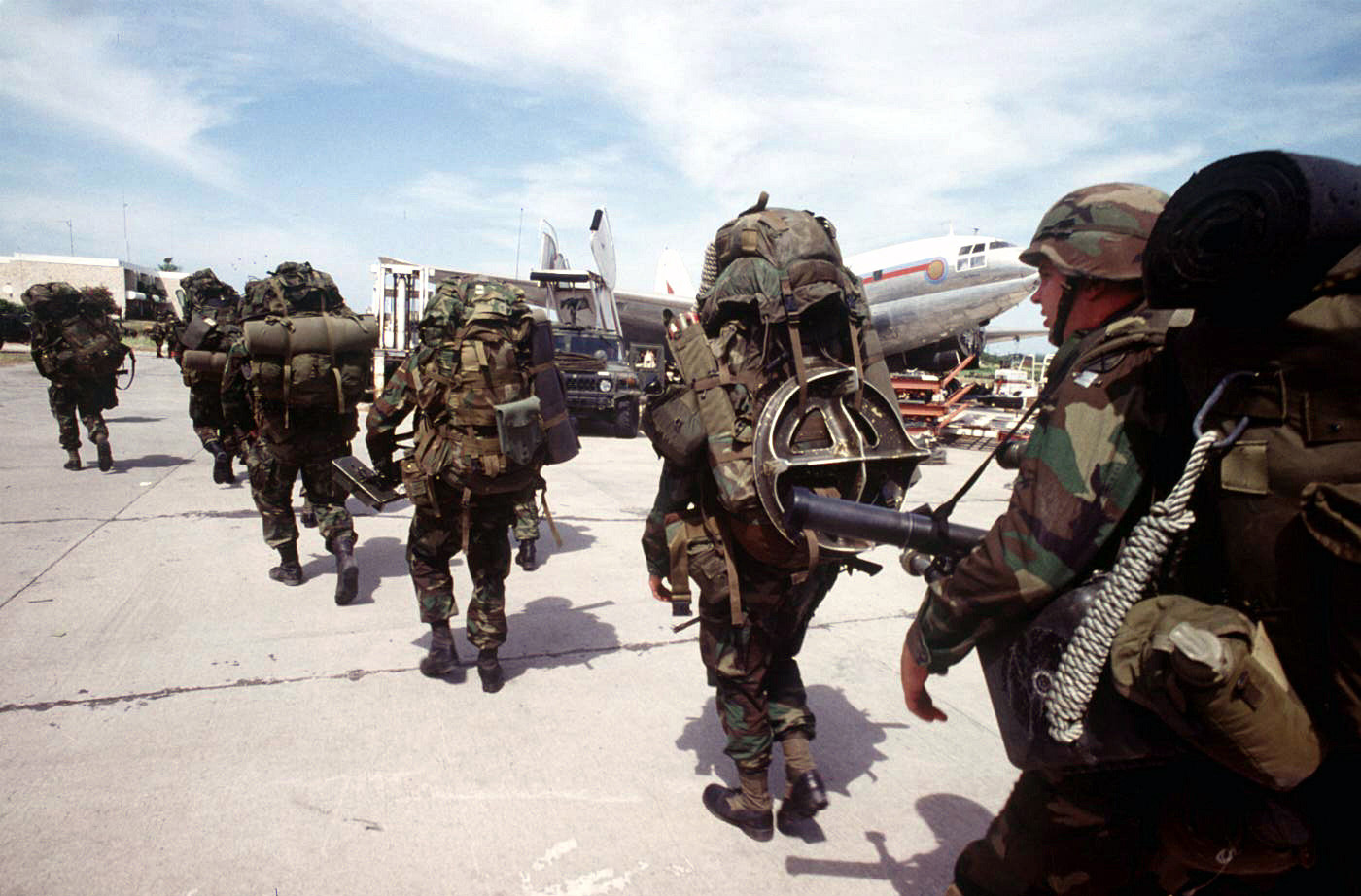 U.S. troops seizing Port-au-Prince airfield, September 1994 An estimated 3,000–5,000 Haitians were killed during the period of military rule. The coup created a large-scale exodus of refugees to the United States. The United States Coast Guard interdicted (in many cases, rescued) a total of 41,342 Haitians during 1991 and 1992. Most were denied entry to the United States and repatriated back to Haiti. Aristide has accused the United States of backing the 1991 coup.[82] In response to the coup, the United Nations Security Council passed Resolution 841 imposing international sanctions and an arms embargo on Haiti. On 16 February 1993, the ferry Neptune sank, drowning an estimated 700 passengers. This was the worst ferry disaster in Haitian history.[83][84][85] The military regime governed Haiti until 1994, and according to some sources included drug trafficking led by Chief of National Police Michel François. Various initiatives to end the political crisis through the peaceful restoration of the constitutionally elected government failed. In July 1994, as repression mounted in Haiti and a civilian human rights monitoring mission was expelled from the country, the United Nations Security Council adopted United Nations Security Council Resolution 940, which authorized member states to use all necessary means to facilitate the departure of Haiti's military leadership and to restore Haiti's constitutionally elected government to power. |
軍事政権(1991年~1994年) 1994年9月、米軍がポルトープランス飛行場を占拠 軍事政権下で、推定3,000人から5,000人のハイチ人が死亡した。このクーデターにより、米国への大規模な難民流出が発生した。米国沿岸警備隊は、 1991年から1992年にかけて、合計41,342人のハイチ人を阻止(多くの場合は救助)した。その大半は米国への入国を拒否され、ハイチに送還され た。アリスティドは、1991年のクーデターを支援したとしてアメリカ合衆国を非難した。[82] このクーデターを受けて、国際連合安全保障理事会は、ハイチに対する国際制裁と武器禁輸を課す決議841を可決した。 1993年2月16日、フェリーネプチューン号が沈没し、700人もの乗客が死亡した。これはハイチ史上最悪の海難事故であった。[83][84] [85] 1994年まで軍事政権がハイチを統治し、一部の情報によると、国家警察長官ミシェル・フランソワが主導する麻薬密売も含まれていた。憲法で選出された政 府を平和的に復権させることで政治危機を終結させようとするさまざまな取り組みは失敗した。1994年7月、ハイチ国内での弾圧が激化し、民間人による人 権監視団が国外追放される中、国連安全保障理事会は国連安全保障理事会決議940を採択した。この決議は、加盟国に対し、ハイチの軍事指導者の退陣を促 し、憲法で選出された政府を再び政権の座に就かせるために、あらゆる必要な手段を用いることを認める内容であった。 |
President Jean-Bertrand Aristide
returns triumphantly to the National Palace at Port-au-Prince, Haiti in
1994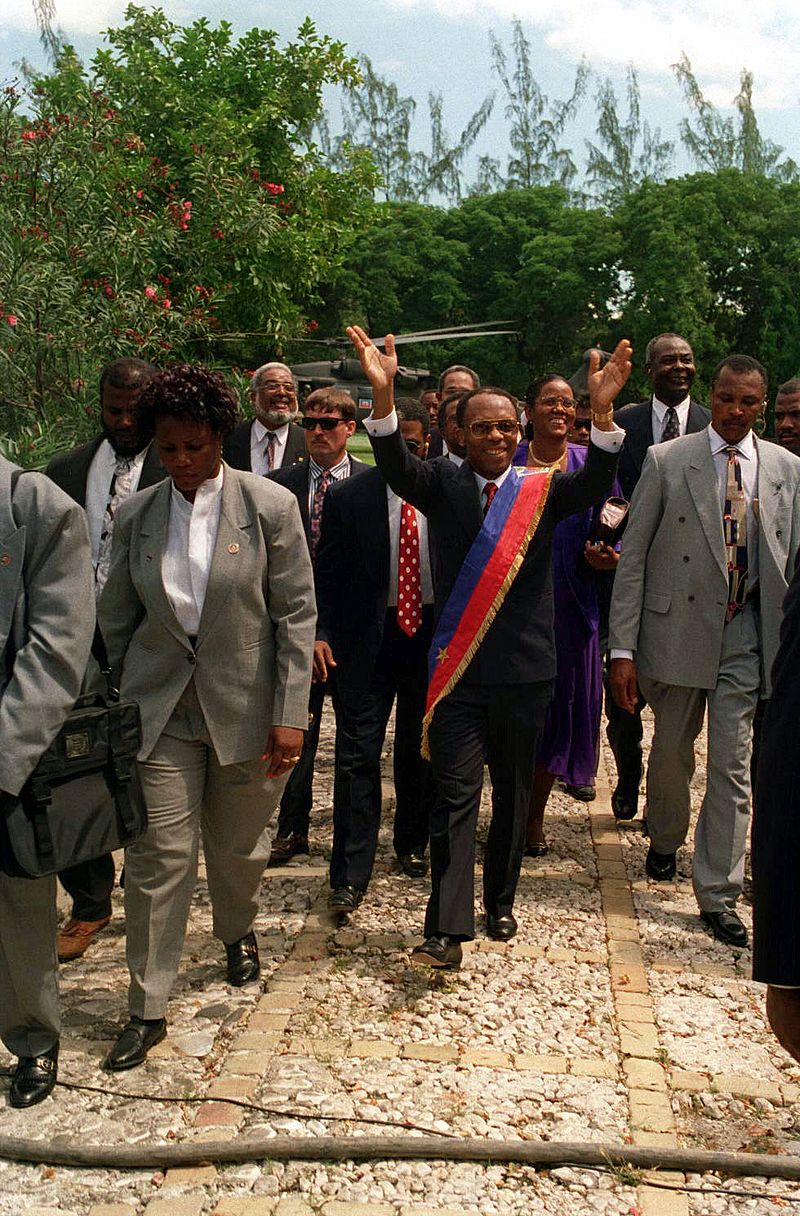 |
1994年、ジャン=ベルトラン・アリスティド大統領が、ハイチのポル
トープランスにある国立宮殿に凱旋した。 |
| The return of Aristide
(1994–1996) In mid-September 1994, with U.S. troops prepared to enter Haiti by force for Operation Uphold Democracy, President Bill Clinton dispatched a negotiating team led by former president Jimmy Carter to persuade the authorities to step aside and allow for the return of constitutional rule. With intervening troops already airborne, Cédras and other top leaders agreed to step down. In October, Aristide was able to return. The Haitian general election, 1995 in June 1995 saw Aristide's coalition, the Lavalas (Waterfall) Political Organization, gain a sweeping victory, and René Préval, a prominent Aristide political ally, elected president with 88% of the vote. When Aristide's term ended in February 1996, this was Haiti's first ever transition between two democratically elected presidents. |
アリスティド大統領の復帰(1994年~1996年) 1994年9月中旬、ビル・クリントン大統領は、米軍が「民主主義を守る作戦」のためにハイチに武力介入する準備を進める中、ジミー・カーター元大統領を 団長とする交渉団を派遣し、当局に退陣して憲法に基づく統治の復活を認めるよう説得した。すでに空挺部隊が投入されていたため、セドラスをはじめとする最 高指導者らは退陣に同意した。10月には、アリステイドが帰国することができた。1995年6月のハイチ総選挙では、アリステの連合であるラヴァラス (滝)政治機構が圧勝し、アリステの有力な政治同盟者であるレネ・プレヴァルが88%の得票率で大統領に選出された。1996年2月にアリステの任期が終 了すると、これはハイチ史上初の民主的に選出された2人の大統領間の移行となった。 |
Preval's first Presidency
(1996–2001)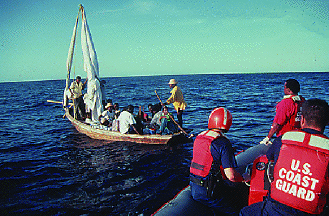 U.S. Coast Guard intercepting Haitian refugees, 1998 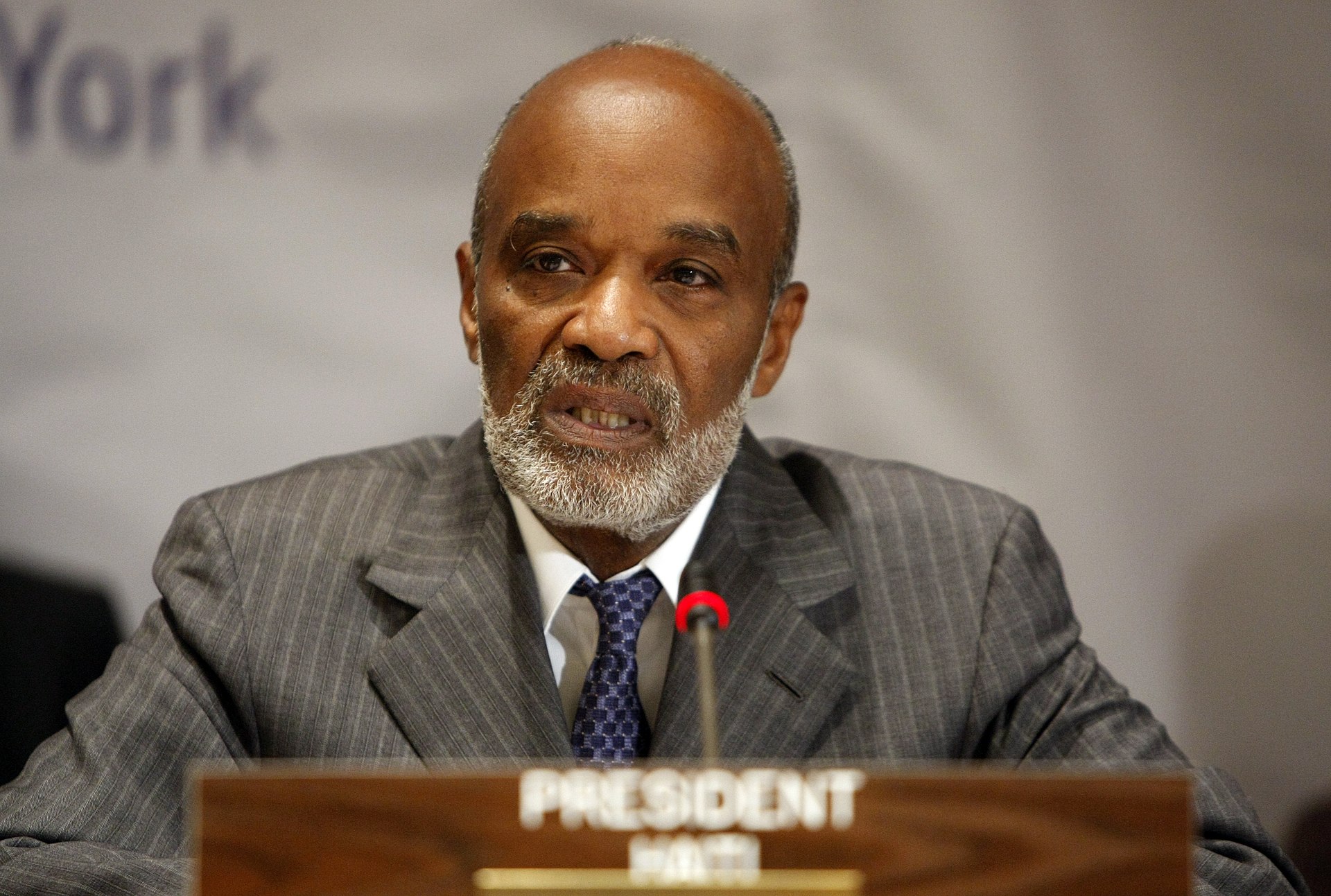 René Préval In late 1996, Aristide broke with Préval and formed a new political party, the Lavalas Family (Fanmi Lavalas, FL), which won elections in April 1997 for one-third of the Senate and local assemblies, but these results were not accepted by the government. The split between Aristide and Préval produced a dangerous political deadlock, and the government was unable to organize the local and parliamentary elections due in late 1998. In January 1999, Préval dismissed legislators whose terms had expired – the entire Chamber of Deputies and all but nine members of the Senate, and Préval then ruled by decree. |
プレヴァルの第一統領職(1996年~2001年) 1998年、ハイチ難民を阻止する米国沿岸警備隊  ルネ・プレヴァル 1996年後半、アリスティドはプレヴァルと決別し、新党ラヴァラス・ファミリー(Fanmi Lavalas、FL)を結成した。同党は1997年4月の上院および地方議会選挙で3分の1の議席を獲得したが、この結果は政府に受け入れられなかっ た。アリステイドとプレヴァルの対立により、政治は危険な行き詰まりに陥り、1998年後半に予定されていた地方議会選挙の実施は不可能となった。 1999年1月、プレヴァルは任期満了となった議員を解任した。すなわち、代議院の全議員と上院の9名以外の議員全員を解任し、その後は政令によって統治 した。 |
| Aristide's second presidency
(2001–2004) In May 2000 the Haitian legislative election, 2000 for the Chamber of Deputies and two-thirds of the Senate took place. The election drew a voter turnout of more than 60%, and the FL won a virtual sweep. However, the elections were marred by controversy in the Senate race over the calculation of whether Senate candidates had achieved the majority required to avoid a run-off election (in Haiti, seats where no candidate wins an absolute majority of votes cast has to enter a second-round run-off election). The validity of the Electoral Council's post-ballot calculations of whether a majority had been attained was disputed. The Organization of American States complained about the calculation and declined to observe the July run-off elections. The opposition parties, regrouped in the Democratic Convergence (Convergence Démocratique, CD), demanded that the elections be annulled, and that Préval stand down and be replaced by a provisional government. In the meantime, the opposition announced it would boycott the November presidential and senatorial elections. Haiti's main aid donors threatened to cut off aid. At the November 2000 elections, boycotted by the opposition, Aristide was again elected president, with more than 90% of the vote, on a turnout of around 50% according to international observers. The opposition refused to accept the result or to recognize Aristide as president. Due to these events, Haiti's donor, the European Union and the United States, cut off aid to the country.[86] Allegations emerged of drug trafficking reaching into the upper echelons of government, as it had done under the military regimes of the 1980s and early 1990s (illegal drug trade in Haiti). Canadian police arrested Oriel Jean, Aristide's security chief and one of his most trusted friends, for money laundering.[87] Beaudoin Ketant, a notorious international drug trafficker, Aristide's close partner, and his daughter's godfather, claimed that Aristide "turned the country into a narco-country; it's a one-man show; you either pay (Aristide) or you die".[88] Aristide spent years negotiating with the Convergence Démocratique on new elections, but the Convergence's inability to develop a sufficient electoral base made elections unattractive, and it rejected every deal offered, preferring to call for a US invasion to topple Aristide. |
アリスティド大統領の2度目の大統領就任(2001年~2004年) 2000年5月、下院議員選挙と上院議員の3分の2の改選が行われた。この選挙では60%以上の投票率を記録し、FLがほぼ全勝した。しかし、上院選で は、決選投票を回避するために必要な過半数を候補者が獲得したかどうかの計算をめぐって論争が起こり、選挙は汚点を残す結果となった(ハイチでは、どの候 補者も投票総数の絶対多数を獲得できなかった議席は決選投票に進む必要がある)。選挙管理委員会が投票後に過半数を獲得したかどうかを計算したことの妥当 性が疑問視された。米州機構は、この計算方法に異議を唱え、7月の決選投票の監視を拒否した。野党は民主党(Convergence Démocratique、CD)に再編成され、選挙の無効とプレヴァルの辞任、暫定政府の樹立を要求した。その間、野党は11月の大統領および上院議員 選挙をボイコットすると発表した。ハイチの主要な支援国は、支援を打ち切ることを示唆した。野党がボイコットした2000年11月の選挙では、国際監視団 によると投票率は約50%であったが、アリスティドは90%以上の得票率で再び大統領に選出された。野党は結果を受け入れることも、アリスティドを大統領 として認めることも拒否した。これらの出来事により、ハイチの援助国である欧州連合と米国はハイチへの援助を打ち切った。 1980年代から1990年代初頭の軍事政権下でそうであったように、政府高官層にまで麻薬密売が及んでいるとの疑惑が浮上した(ハイチにおける違法麻薬 取引)。カナダ警察は、アリステイド大統領の側近で最も信頼されていた人物の一人であるオリエル・ジーンをマネーロンダリング容疑で逮捕した。[87] 悪名高い国際麻薬密売業者でアリステイド大統領の側近であり、大統領の娘のゴッドファーザーでもあるボードワン・ケタンは、「アリステイド大統領は国を麻 薬国家にした。それはワンマンショーだ。(アリステイド大統領に)金を払うか、さもなければ死ぬしかない」と主張した。[88] アリスティドは、コンバージェンス・デモクラティックと新たな選挙について何年も交渉を続けたが、コンバージェンスには十分な選挙基盤を築く能力がなく、 選挙は魅力のないものとなり、コンバージェンスは提示されたすべての取引を拒否し、アリスティドを失脚させるために米国の侵攻を求めることを好んだ。 |
| The 2004 coup d'état Main article: 2004 Haitian coup d'état Anti-Aristide protests in January 2004 led to violent clashes in Port-au-Prince, causing several deaths. In February, a revolt broke out in the city of Gonaïves, which was soon under rebel control. The rebellion then began to spread, and Cap-Haïtien, Haiti's second-largest city, was captured. A mediation team of diplomats presented a plan to reduce Aristide's power while allowing him to remain in office until the end of his constitutional term. Although Aristide accepted the plan, it was rejected by the opposition. 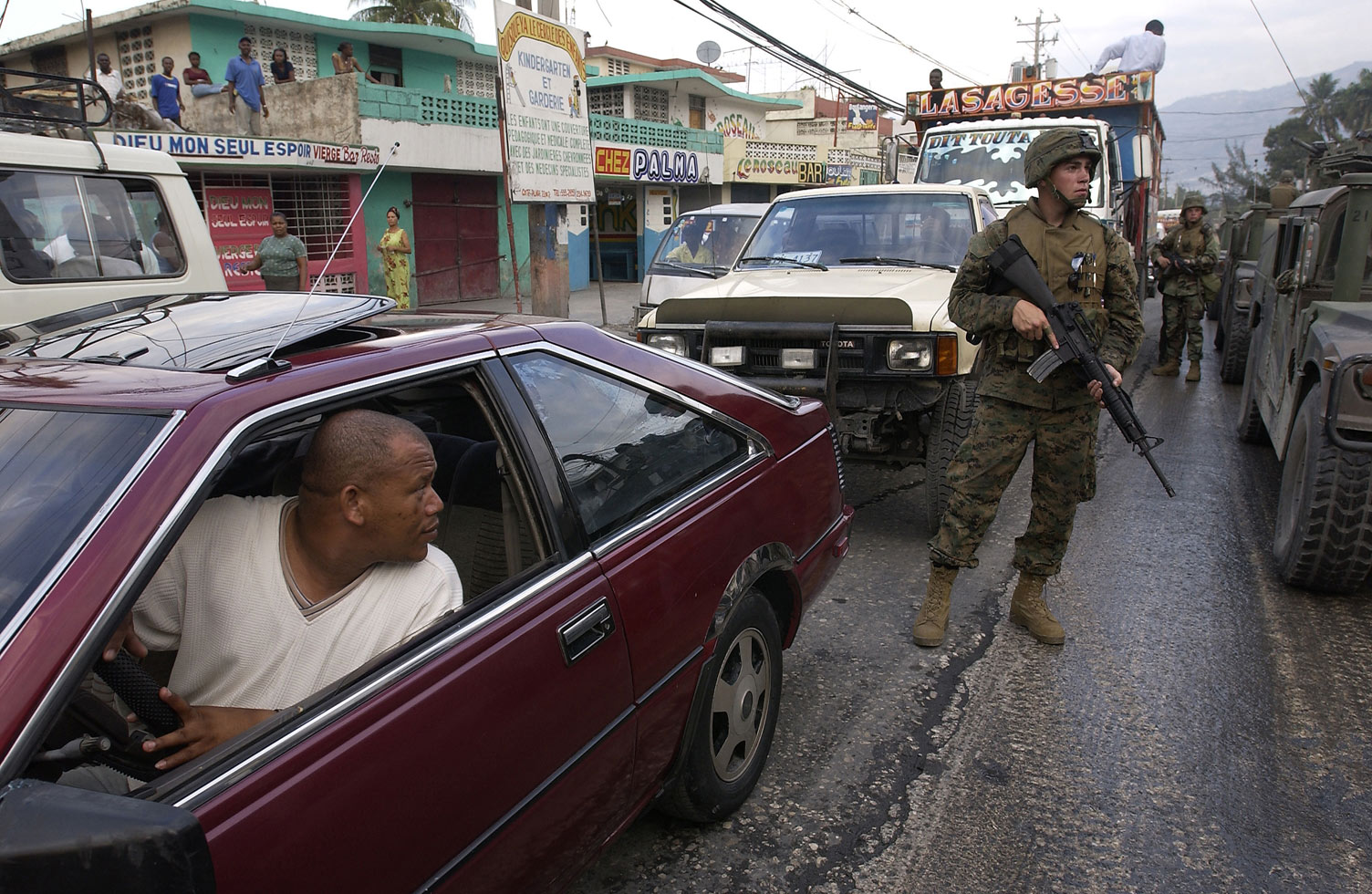 U.S. Marines patrol the streets of Port-au-Prince on 9 March 2004 On 29 February 2004, with rebel contingents marching towards Port-au-Prince, Aristide departed from Haiti. Aristide insists that he was essentially kidnapped by the U.S., while the U.S. State Department maintains that he resigned from office. Aristide and his wife left Haiti on an American airplane, escorted by American diplomats and military personnel, and were flown directly to Bangui, capital of the Central African Republic, where he stayed for the following two weeks, before seeking asylum in a less remote location. Though this has never been proven, many observers in the press and academia believe that the US has not provided convincing answers to several of the more suspicious details surrounding the coup, such as the circumstances under which the US obtained Aristide's purported letter of "resignation" (as presented by the US) which, translated from Kreyòl, may not have actually read as a resignation.[89] Aristide has accused the U.S. of deposing him in concert with the Haitian opposition.[90] In a 2006 interview, he said the U.S. went back on their word regarding compromises he made with them over privatization of enterprises to ensure that part of the profits would go to the Haitian people and then "relied on a disinformation campaign" to discredit him.[91] Political organizations and writers, as well as Aristide himself, have suggested that the rebellion was in fact a foreign controlled coup d'état. Caricom, which had been backing the peace deal, accused the United States, France, and the International community of failing in Haiti because they allegedly allowed a controversially elected leader to be violently forced out of office. The international community stated that the crisis was of Aristide's making and that he was not acting in the best interests of his country. They have argued that his removal was necessary for future stability in the island state.[90] Investigators claimed to have discovered extensive embezzlement, corruption, and money laundering by Aristide. It was claimed Aristide had stolen tens of millions of dollars from the country.[92][93][94] None of the allegations about Aristide's involvement in embezzlement, corruption, or money laundering schemes could be proven.[clarification needed] The criminal court case brought against Aristide was quietly shelved, though various members of his Lavalas party languished for years in prison without charge or trial due to similar accusations[95] The Haitian government suspended the suit against Aristide on 30 Jun 2006 to prevent it from being thrown out for want of prosecution.[96] 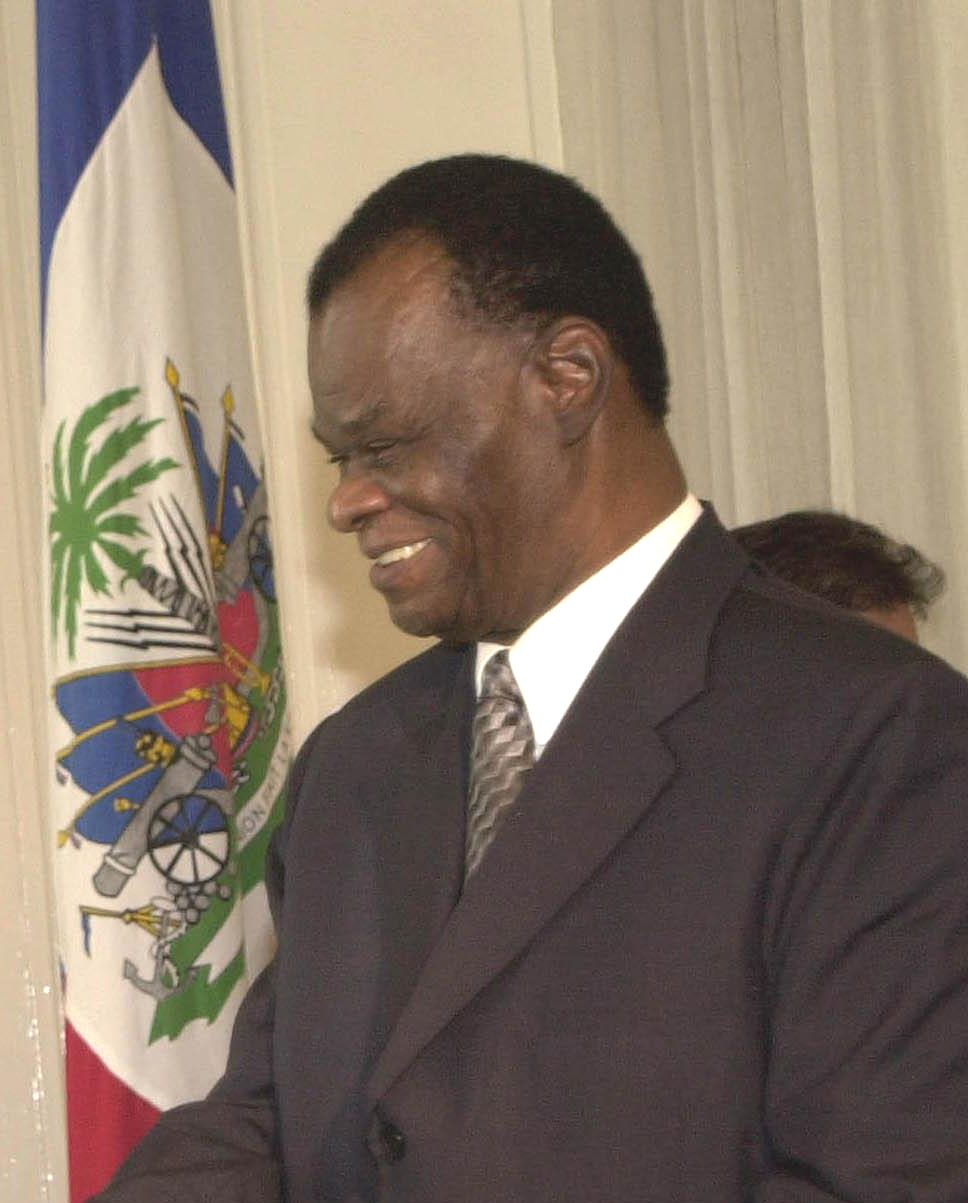 Provisional President Boniface Alexandre (2004–2006) led the intervention of the UN peacekeeping force in Haiti in 2004 The government was taken over by Supreme Court Chief Justice Boniface Alexandre. Alexandre petitioned the United Nations Security Council for the intervention of an international peacekeeping force. The Security Council passed a resolution the same day "[t]aking note of the resignation of Jean-Bertrand Aristide as President of Haiti and the swearing-in of President Boniface Alexandre as the acting President of Haiti in accordance with the Constitution of Haiti" and authorized such a mission.[97] As a vanguard of the official U.N. force, a force of about 1,000 U.S. Marines arrived in Haiti within the day, and Canadian and French troops arrived the next morning; the United Nations indicated it would send a team to assess the situation within days. On 1 June 2004, the peacekeeping mission was passed to MINUSTAH and comprised a 7,000 strength force led by Brazil and backed by Argentina, Chile, Jordan, Morocco, Nepal, Peru, Philippines, Spain, Sri Lanka, and Uruguay.[98] Brazilian forces led the United Nations peacekeeping troops in Haiti composed of United States, France, Canada, and Chile deployments. These peacekeeping troops were a part of the ongoing MINUSTAH operation. In November 2004, the University of Miami School of Law carried out a Human Rights Investigation in Haiti and documented serious human rights abuses. It stated that "summary executions are a police tactic."[99] It also suggested a "disturbing pattern."[99] In March 2004, the Haiti Commission of Inquiry, headed by former US attorney-general Ramsey Clark, published its findings : "Noting that 200 US special forces had travelled to the Dominican Republic for "military exercises" in February 2003, the commission accused the US of arming and training Haitian rebels there. With permission from the Dominican president, Hipólito Mejía, US forces trained near the border, in an area used by former soldiers of the disbanded Haitian army to launch attacks on Haitian state property."[100] On 15 October 2005, Brazil called for more troops to be sent due to the worsening situation in the country.[101] After Aristide's overthrow, the violence in Haiti continued, despite the presence of peacekeepers. Clashes between police and Fanmi Lavalas supporters were common, and peacekeeping forces were accused of conducting a massacre against the residents of Cité Soleil in July 2005. Several of the protests resulted in violence and deaths.[102][103] |
2004年のクーデター 詳細は「2004年ハイチ・クーデター」を参照 2004年1月の反アリスティド抗議運動は、首都ポルトープランスで暴動に発展し、数名の死者を出した。2月には、ゴナイーブ市で反乱が勃発し、すぐに反 乱軍が制圧した。その後、反乱は拡大し、ハイチ第2の都市であるカパイシャンが制圧された。外交官による調停チームは、憲法で定められた任期が終了するま では現職にとどまることを認める一方で、アリスティドの権限を縮小する案を提示した。アリスティドはこの案を受け入れたが、野党側は拒否した。  2004年3月9日、米海兵隊がポルトープランス市内をパトロール 2004年2月29日、反乱軍がポルトープランスへ向かって進軍する中、アリスティドはハイチを出国した。アリスティドは、米国によって事実上拉致された と主張しているが、米国務省は、彼が自ら辞任したと主張している。アリスティドと妻は、米国の外交官と軍人による護衛付きの米国の飛行機でハイチを離れ、 中央アフリカ共和国の首都バンギに直行した。その後、より辺境ではない場所に亡命するまでの2週間を同国で過ごした。 これは証明されていないが、報道機関や学術界の多くの観察者は、米国がクーデターをめぐる疑わしい詳細事項のいくつかについて、説得力のある回答を提供し ていないと考えている。例えば、米国が入手したとされる「辞任」の書簡(米国が提示)は、クレオール語から翻訳されたもので、実際には辞任の意思表示では ない可能性もある。 アリスティドは、米国がハイチ野党と結託して自分を追放したと非難している。[90] 2006年のインタビューで、彼は、企業民営化に関して米国と妥協し、利益の一部をハイチ国民に還元することを確約したにもかかわらず、米国は約束を破 り、「偽情報を流して」自分を貶めようとしたと述べた。[91] 政治団体や作家、そしてアリスティド自身も、この反乱は実際には外国が操ったクーデターであると示唆している。和平合意を支持していたカリコムは、物議を 醸した選挙で選ばれた指導者が暴力的に辞任させられたとして、米国、フランス、そして国際社会がハイチで失敗したと非難した。国際社会は、この危機はアリ スティド自身が招いたものであり、彼は自国の利益を最優先に考えて行動していないと述べた。彼らは、同国の将来の安定のためには、同大統領の退陣が必要で あると主張した。[90] 捜査官は、アリスティドによる大規模な横領、汚職、資金洗浄を発見したと主張した。アリスティドが数千万ドルを国から盗んだと主張された。[92] [93][94] アリスティドの横領、汚職、資金洗浄への関与に関する疑惑は、いずれも立証できなかった。[要出典] アリスティドに対する刑事裁判はひっそりと 同様の容疑によりラヴァラス党の多くの党員が起訴も裁判も受けずに何年も刑務所で過ごしたが、アリスティドに対する刑事裁判はひっそりと棚上げされた。 [95] ハイチ政府は、訴追の欠如により却下されるのを防ぐため、2006年6月30日にアリスティドに対する訴訟を中断した。[96]  暫定大統領ボニフェース・アレクサンドル(2004年 - 2006年)は、2004年にハイチに国連平和維持軍が介入するよう主導した 最高裁長官のボニフェース・アレクサンドルが政府を掌握した。アレクサンドルは国際平和維持軍の介入を国連安全保障理事会に要請した。安全保障理事会は同 日、「ハイチの大統領であるジャン=ベルトラン・アリスティドの辞任と、憲法に従ってハイチの大統領代行としてボニフェース・アレクサンドルが就任したこ とを留意し」、このようなミッションを承認する決議を可決した。 国連の公式部隊の先鋒として、約1,000人の米海兵隊がその日のうちにハイチに到着し、カナダ軍とフランス軍は翌朝に到着した。国連は数日以内に状況を 評価するチームを派遣すると発表した。2004年6月1日、平和維持活動はMINUSTAHに引き継がれ、ブラジルが主導し、アルゼンチン、チリ、ヨルダ ン、モロッコ、ネパール、ペルー、フィリピン、スペイン、スリランカ、ウルグアイが支援する7,000人規模の部隊で構成された。 ブラジル軍が主導する国連平和維持部隊は、米国、フランス、カナダ、チリが展開するハイチ部隊で構成された。これらの平和維持部隊は、現在進行中の MINUSTAH作戦の一部であった。 2004年11月、マイアミ大学ロースクールはハイチで人権調査を実施し、深刻な人権侵害を文書化した。「即決処刑は警察の戦術である」と述べた。 [99] また、「不穏なパターン」を示唆した。[99] 2004年3月、元米国司法長官ラムゼイ・クラークが率いるハイチ調査委員会は、調査結果を発表した。「2003年2月に200人の米軍特殊部隊がドミニ カ共和国で『軍事演習』を行っていたことを指摘し、委員会は、米国がそこでハイチの反政府勢力に武器と訓練を提供したと非難した。ドミニカ共和国のヒポリ ト・メヒア大統領の許可を得て、米軍は国境付近で、解散したハイチ軍の元兵士たちがハイチ国有財産を攻撃するために使用していた地域で訓練を行っていた」 [100] 2005年10月15日、ブラジルは国内情勢の悪化により、さらなる軍隊の派遣を要請した。[101] アリスティドが打倒された後も、平和維持軍が駐留していたにもかかわらず、ハイチでは暴力が続いた。警察とファンミ・ラヴァラス支持者との衝突は日常茶飯 事であり、2005年7月には平和維持軍がシテ・ソレイユの住民に対して虐殺を行ったと非難された。いくつかの抗議活動は暴力と死を招いた。[102] [103] |
| The second Préval presidency
(2006–2011) In the midst of the ongoing controversy and violence, however, the interim government planned legislative and executive elections. After being postponed several times, these were held in February 2006. The elections were won by René Préval, who had a strong following among the poor, with 51% of the votes.[104] Préval took office in May 2006. In the spring of 2008, Haitians demonstrated against rising food prices. In some instances, the few main roads on the island were blocked with burning tires and the airport at Port-au-Prince was closed.[105] Protests and demonstrations by Fanmi Lavalas continued in 2009.[106] |
プレヴァル大統領の2期目(2006年~2011年) 論争と暴力が続くなか、暫定政府は立法府と行政府の選挙を計画した。 選挙は数度延期された後、2006年2月に実施された。 選挙では、貧困層から強い支持を得ていたルネ・プレヴァルが51%の票を獲得した。[104] プレヴァルは2006年5月に就任した。 2008年春には、ハイチ人が食料価格の高騰に抗議してデモを行った。一部では、島にある数本の幹線道路が燃えたタイヤでふさがれ、ポルトープランスにあ る空港が閉鎖された。[105] ファンミ・ラヴァラスによる抗議とデモは2009年も続いた。[106] |
Earthquake of 2010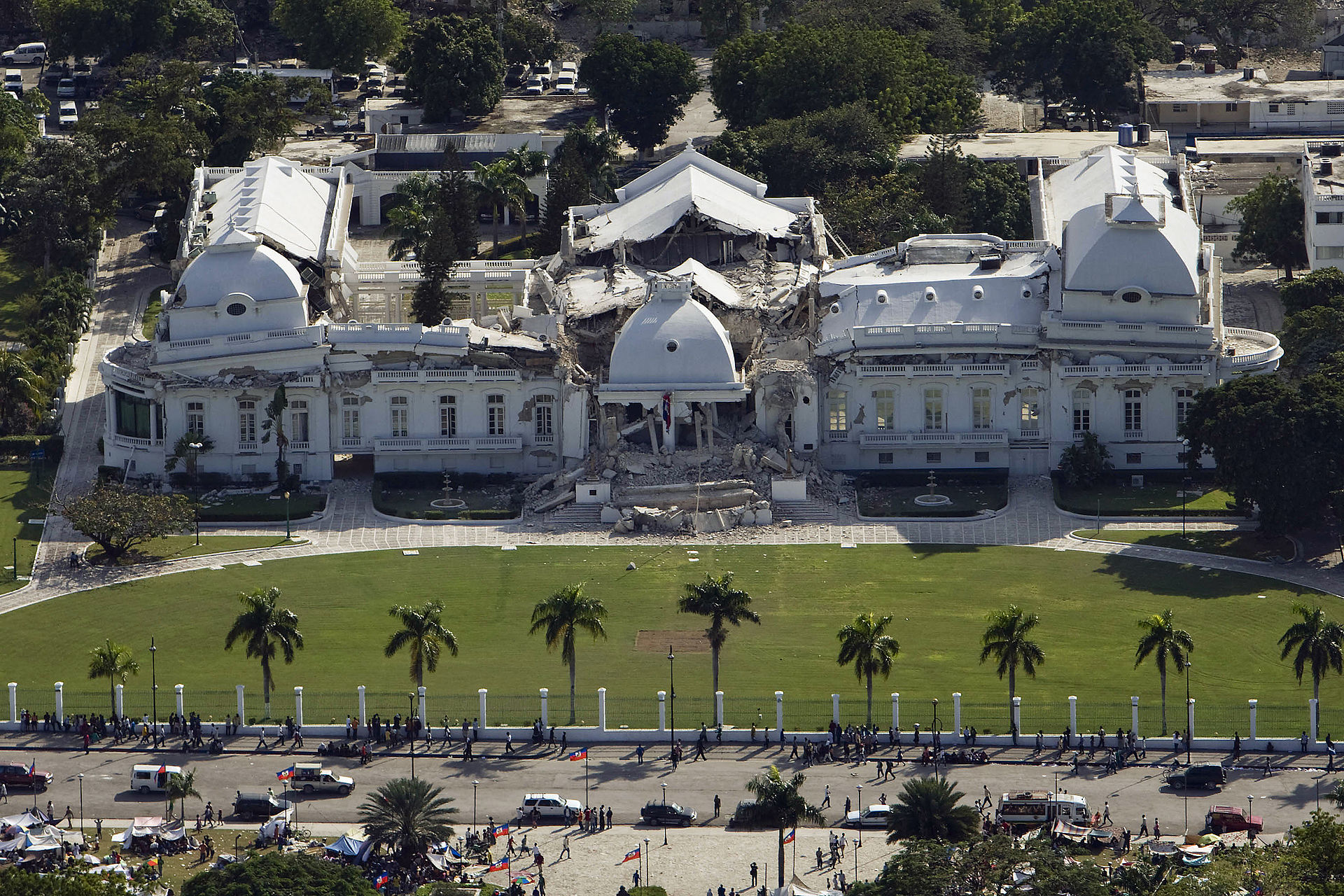 Large portions of the National Palace collapsed Main articles: 2010 Haiti earthquake and Haiti cholera outbreak On 12 January 2010, Port-au-Prince, Haiti suffered a devastating earthquake of magnitude 7.0 with a death toll estimated by the Haitian government at over 300,000, and by non-Haitian sources from 50,000 to 220,000. Aftershocks followed, including one of magnitude 5.9. The capital city, Port-au-Prince, was effectively leveled. A million Haitians were left homeless, and hundreds of thousands starved. The earthquake caused massive devastation with most buildings crumbled, including Haiti's presidential palace. The enormous death toll made it necessary to bury the dead in mass graves. Most bodies were unidentified and few pictures were taken, making it impossible for families to identify their loved ones. The spread of disease was a major secondary disaster. Many survivors were treated for injuries in emergency makeshift hospitals, but many more died of gangrene, malnutrition, and infectious diseases.[107] |
2010年の地震 国立宮殿の大部分が崩壊した 詳細は「2010年ハイチ地震」および「ハイチにおけるコレラの流行」を参照 2010年1月12日、ハイチ・ポルトープランスでマグニチュード7.0の壊滅的な地震が発生し、ハイチ政府は死者数を30万人以上と推定したが、ハイチ 国外の情報筋は5万人から22万人と推定した。マグニチュード5.9を含む余震も発生した。首都ポルトープランスはほぼ壊滅状態となった。100万人のハ イチ人が家を失い、数十万人が飢餓に直面した。地震により、ほとんどの建物が倒壊し、ハイチの大統領官邸も崩壊するなど、甚大な被害が発生した。多数の死 者が出たため、死体を集団埋葬する必要があった。ほとんどの遺体は身元不明であり、写真もほとんど撮影されなかったため、家族が愛する人の遺体を確認する ことができなかった。病気の蔓延は、二次災害の大きな要因となった。多くの生存者は、緊急の仮設病院で負傷の治療を受けたが、壊疽、栄養失調、感染症によ りさらに多くの死者が出た。[107] |
The Martelly presidency
(2011–2016)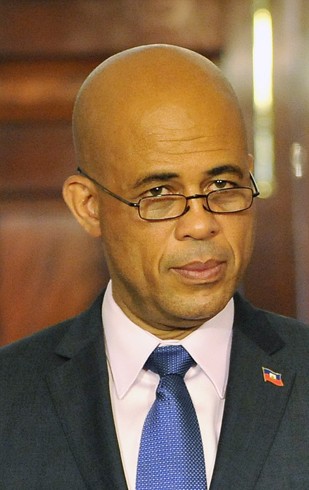 Michel Martelly On 4 April 2011, a senior Haitian official announced that Michel Martelly had won the second round of the election against candidate Mirlande Manigat.[108] The election involved voter suppression and other methods of rigging.[109] Michel Martelly also known by his stage name "Sweet Micky" is a former musician and businessman. Martelly's administration was met with both anger and acclaim. On one hand, he and his associates were accused of being involved in money laundering and various other crimes resulting in countless demonstrations (which on many occasions would become violent). Many criticized him for the slow progression of the reconstruction phase following the recent quake, or for taking credit for projects started in previous administrations. Some disliked him for his vulgar language and risque past which did not seem to completely go away upon taking presidency. On the other hand, many believe that he was the most productive Haitian president since the Duvalier era. Under his administration, the majority of those left homeless following the quake were given new housing. He offered free education programs to large portions of the Haitian youth as well as an income program for Haitian mothers and students. The administration launched a massive reconstruction program involving principle administration district, Champs-de-Mars, that would modernize and rehabilitate various government buildings, public places, and parks. Michel Martelly put emphasis on foreign investment and business with his slogan "Haiti is Open for Business". Perhaps one of the more major contributions made for the revitalization of the Haitian economy was their push for tourists. Minister of Tourism, Stéphanie Villedrouin, embarked on various competitive tourist projects, including the development of Ile-a-Vache, Jacmel, the north, south-west, and Cotes-des-Arcadins. Tourism had risen significantly between 2012 and 2016.[110] On 8 February 2016, Michel Martelly stepped down at the end of his term without a successor in place.[111] |
マルテリー大統領(2011年~2016年) ミシェル・マルテリー 2011年4月4日、ハイチ政府高官は、ミシェル・マルテリーがミランダ・マニガト候補との決選投票で勝利したと発表した。[108] この選挙では、有権者の抑圧やその他の不正行為が行われた。[109] ミシェル・マルテリーは、芸名の「スウィート・ミッキー」でも知られる元ミュージシャン兼実業家である。マルテリー政権は、怒りと賞賛の両方を買った。一 方で、彼と彼の側近はマネーロンダリングやその他の犯罪に関与したとして非難され、無数のデモ(多くの場合、暴力的なものとなった)を引き起こした。ま た、多くの人々が、最近の地震後の復興の遅さや、以前の政権で着手されたプロジェクトを自分の手柄にしていることなどを批判した。また、下品な言葉遣い や、大統領就任後も消えることのないきわどい過去を嫌う人もいた。 一方で、デュバリエ時代以降のハイチ大統領の中で最も成果を残した大統領であると評価する人も多い。 彼の政権下では、地震で家を失った被災者の大半に新しい住宅が提供された。また、多くのハイチ人若者たちに無償の教育プログラムを提供し、ハイチ人女性や 学生を対象とした収入プログラムも実施した。 行政は、主要行政地区であるシャン・ド・マルス(Champs-de-Mars)を含む大規模な復興プログラムを開始し、さまざまな政府ビル、公共施設、 公園の近代化と修復に取り組んだ。 ミシェル・マルテリー大統領は、「ハイチはビジネスにオープンです」というスローガンを掲げ、外国からの投資とビジネスに重点を置いた。おそらく、ハイチ 経済の活性化に最も大きく貢献したもののひとつは、観光客誘致への取り組みであった。観光大臣のステファニー・ヴィルドロワンは、イル・ア・ヴァッシュ 島、ジャクメル、北部、南西部、コート・デ・アルカディンなどの開発を含む、さまざまな競争力のある観光プロジェクトに着手した。観光業は2012年から 2016年の間に大幅に増加した。[110] 2016年2月8日、ミシェル・マルテリーは後継者を置かずに任期満了で退任した。[111] |
| The Moïse presidency (2017–2021) See also: Haitian crisis (2018–present) Jovenel Moïse Following Hurricane Mathew, Jovenel Moïse was chosen to succeed Martelly as president in an election that has been described by activists as an "electoral coup d'etat."[112] The United States supervised the elections and spent upwards of $33 million on them, spending which has been criticized for its inefficiency, with high overhead costs but little done to stop the widespread fraud, violence, and voter suppression present.[113] Moïse was inaugurated on the grounds where the national palace had been on 7 February 2017. He went on to start the "Caravan de Changement" project, which aims to revitalize the industries and infrastructure of Haiti's less popular areas. However, the actual impact of these efforts is debated. In recent months, Moïse has been implicated in the embezzlement of funds from the PetroCaribe program, as has his predecessor, Martelly. On 7 July 2018 protests led by opposition politician Jean-Charles Moïse began, demanding the resignation of Jovenel Moïse. Released in November 2017, a Senate probe of the period 2008–2016 (concerning the René Préval and Michel Martelly administrations, as well as the chief of staff of then-sitting President Jovenel Moïse) revealed significant corruption had been funded with Venezuelan loans through the Petrocaribe program.[114] Significant protests broke out in February 2019 following a report from the court investigating the Petrocaribe Senate probe.[115][116] A new round of protests broke out in February 2021 amid a dispute over Moïse's presidential term. The protesters claim that Moïse's term officially ended on 7 February 2021 and demanded that he step down. Moïse, however, claimed that he has one more year to serve because of delays in starting his term. Protesters have also expressed concerns about a referendum proposed by Moïse, which would reportedly scrap the ban on consecutive presidential terms and enable Moïse to run again.[117] On 7 July 2021 President Moïse was assassinated. Prime Minister Claude Joseph became interim president.[118] |
モイーズ大統領(2017年~2021年) 関連項目:ハイチ危機(2018年~現在) ジョベネル・モイーズ ハリケーン・マシューの後、活動家たちから「選挙クーデター」と評された選挙で、ジョベネル・モイーズがマルテリー大統領の後任として選出された。 [112] アメリカ合衆国が選挙を監督し、3300万ドル以上を支出した この支出は非効率的であり、間接費は高いが、蔓延する不正行為、暴力、有権者の抑圧を阻止するためにほとんど行われなかったとして批判されている。 [113] モイーズは2017年2月7日に国民宮殿があった場所で就任式を行った。彼はその後、「Caravan de Changement」プロジェクトを開始した。これは、ハイチの人気のない地域の産業とインフラの活性化を目指すものである。しかし、これらの取り組み の実際の影響については議論の余地がある。ここ数か月間、モイーズは前任者のマルテリー同様、ペトロカリベ計画からの資金の横領に関与しているとされてい る。 2018年7月7日、野党政治家ジャン=シャルル・モイーズが主導する抗議活動が始まり、ジョブネル・モイーズの辞任を要求した。2017年11月に発表 された上院による2008年から2016年までの調査(レネ・プレヴァル、ミシェル・マルテリー両政権、および当時在任中のジョブネル・モイーズ大統領の 首席補佐官に関するもの)では、 ペトロカリベ計画を通じてベネズエラからの融資で多額の汚職が行われていたことが明らかになった。[114] ペトロカリベに関する上院の調査を担当する裁判所からの報告書を受けて、2019年2月に大規模な抗議活動が発生した。[115][116] 2021年2月、モイーズの大統領任期を巡る論争の中で、新たな抗議活動が勃発した。抗議者たちは、モイーズの任期は2021年2月7日に正式に終了した と主張し、退陣を要求した。しかし、モイーズは任期開始の遅れにより、あと1年は務めることができると主張した。抗議者らは、モイーズが提案した国民投票 についても懸念を示している。この国民投票が実施されれば、大統領の連続任期禁止が廃止され、モイーズが再び出馬できるようになると言われている。 [117] 2021年7月7日、モイーズ大統領が暗殺された。クロード・ジョセフ首相が暫定大統領に就任した。[118] |
| The Henry presidency (2021-2024) Ariel Henry served as the acting prime minister and the acting president between 20 July 2021 and March 2024.[119] 2021 earthquake On 14 August 2021, a strong 7.2 earthquake occurred in Haiti. The earthquake spawned tsunami warnings on the Haitian Coast. The warning was cancelled later that day. The death toll from the quake as of 15 August 2021 is 1,419 people.[120] Gang violence See also: Gang war in Haiti and 2022 Haitian crisis On 7 July 2022 massive clashes between two rival gangs began in Cité Soleil, an impoverished and densely populated neighborhood of Port-au-Prince. Thousands of families had to hide inside their homes, unable to get food or water; dozens of residents were killed by stray bullets. A week of gang violence has left at least 89 people dead. Since an oil terminal that supplies the capital and all of northern Haiti is located in Cite Soleil, the clashes have had a devastating effect on the region's economy.[121][122] On 11 October 2022, Henry and his cabinet requested the deployment of foreign troops to oppose the gangs and anti-government demonstrations in Port-au-Prince.[123] On 15 October, the United States and Canada sent armored vehicles and military equipment to aid the Haitian government.[124] On 2 March 2024 gangs attacked two prisons in Haiti, including the country's largest penitentiary, and allowed prisoners to escape. This was a part of a wave of attacks that the gangs carried out while prime minister Henry traveled to Kenya to finalize an agreement under which that country would send 1,000 police officers to help restore order to Haiti. The goal of the gangs, according to Jimmy Chérizier, a gang leader known as Barbecue, is to overthrow what remains of the government.[125] On 4 March, armed gangs attacked the heavily fortified Toussaint Louverture International Airport, exchanging gunfire with police and the Haitian Armed Forces in an attempt to take control of the facility after rumors that Henry would return to the country.[126] fueling speculation that an alliance between rival gangs is forming to overthrow the Haitian elite.[127] On 12 March, prime minister Ariel Henry said that he will resign when a transitional presidential council is created.[128] On 25 April 2024, as the Transitional Presidential Council was sworn in, he presented his resignation in a letter signed on 24 April in Los Angeles. Henry's outgoing Cabinet appointed Economy and Finance Minister Michel Patrick Boisvert as interim prime minister.[129][130] |
ヘンリー大統領(2021年-2024年) アリエル・ヘンリーは、2021年7月20日から2024年3月まで、首相代行および大統領代行を務めた。[119] 2021年の地震 2021年8月14日、ハイチでマグニチュード7.2の強い地震が発生した。この地震により、ハイチ沿岸で津波警報が発令された。この警報は同日中に解除 された。2021年8月15日時点での地震による死者数は1,419人に上っている。 ギャングによる暴力 関連項目:ハイチにおけるギャング抗争、2022年ハイチ危機 2022年7月7日、ポルトープランスにある貧困層が多く住む密集した地域シテ・ソレイユで、2つの敵対するギャング集団の間で大規模な衝突が発生した。 数千世帯が食料や水を得ることができず、自宅に隠れることを余儀なくされた。数十人の住民が流れ弾に当たって死亡した。ギャングによる暴力が1週間続いた 結果、少なくとも89人が死亡した。首都およびハイチ北部全域に石油を供給する石油ターミナルがシテ・ソレイユにあるため、この衝突は同地域の経済に壊滅 的な影響を与えた。[121][122] 2022年10月11日、ヘンリー首相と内閣は、ポルトープランスにおけるギャングと反政府デモに対抗するために外国軍の派遣を要請した。[123] 10月15日、米国とカナダは装甲車と軍事装備をハイチ政府に援助として送った。[124] 2024年3月2日、ギャング集団がハイチ国内の2つの刑務所(そのうちの1つは同国最大の刑務所)を襲撃し、受刑者の脱獄を許した。これは、ヘンリー首 相がケニアを訪問し、同国からハイチの治安回復のために1,000人の警察官を派遣するという合意を最終的にまとめる間、ギャング集団が相次いで攻撃を仕 掛けた一環であった。ギャングのリーダーであるジミー・シェリジエ(通称バーベキュー)によると、ギャングの目的は、残存する政府を転覆させることだとい う。[125] 3月4日、武装集団が厳重に要塞化されたトゥーサン・ルーヴェルチュール国際空港を襲撃し、ヘンリーが帰国するという噂を受けて、警察およびハイチ軍と銃 撃戦を繰り広げ、施設を掌握しようとした。[126] ハイチエリートを打倒するために、対立するギャング集団間の同盟が形成されつつあるのではないかという憶測を煽った。[127] 3月12日、アリエル・ヘンリー首相は、移行期の大統領評議会が発足した時点で辞任する意向を表明した。[128] 2024年4月25日、移行期の大統領評議会が就任宣誓を行った際、ヘンリー首相はロサンゼルスで4月24日に署名した書簡で辞表を提出した。ヘンリー首 相の退任内閣は、ミシェル・パトリック・ボワヴェール経済・財務大臣を暫定首相に任命した。[129][130] |
| External debt of Haiti French colonization of the Americas History of the Americas History of the Caribbean History of the Dominican Republic History of Latin America History of North America List of heads of state of Haiti Parsley Massacre—Trujillo's Massacre of Haitians Politics of Haiti Spanish colonization of the Americas Timeline of Haitian history United States occupation of Haiti 2018–2019 Haitian protests 2020 Royal Chapel of Milot fire |
ハイチの対外債務 アメリカ大陸のフランスによる植民地化 アメリカ大陸の歴史 カリブ海の歴史 ドミニカ共和国の歴史 ラテンアメリカの歴史 北アメリカの歴史 ハイチの国家元首の一覧 パセリ虐殺 - トリニダード・トゥルヒーヨによるハイチ人虐殺 ハイチの政治 アメリカ大陸のスペインによる植民地化 ハイチの歴史年表 アメリカ合衆国のハイチ占領 2018年から2019年のハイチ抗議運動 2020年 ミロの王室礼拝堂火災 |
| https://en.wikipedia.org/wiki/History_of_Haiti |
リ ンク
文 献
そ の他の情報
Copyleft,
CC, Mitzub'ixi Quq Chi'j, 1996-2099
Copyleft, CC, Mitzub'ixi Quq Chi'j, 1996-2099
☆
 ☆
☆